

Along with records broken and medals celebrated, competing at the Olympics is more often littered with narrow defeats, last-gasp errors and mental meltdowns that build true character and sportsmanship.
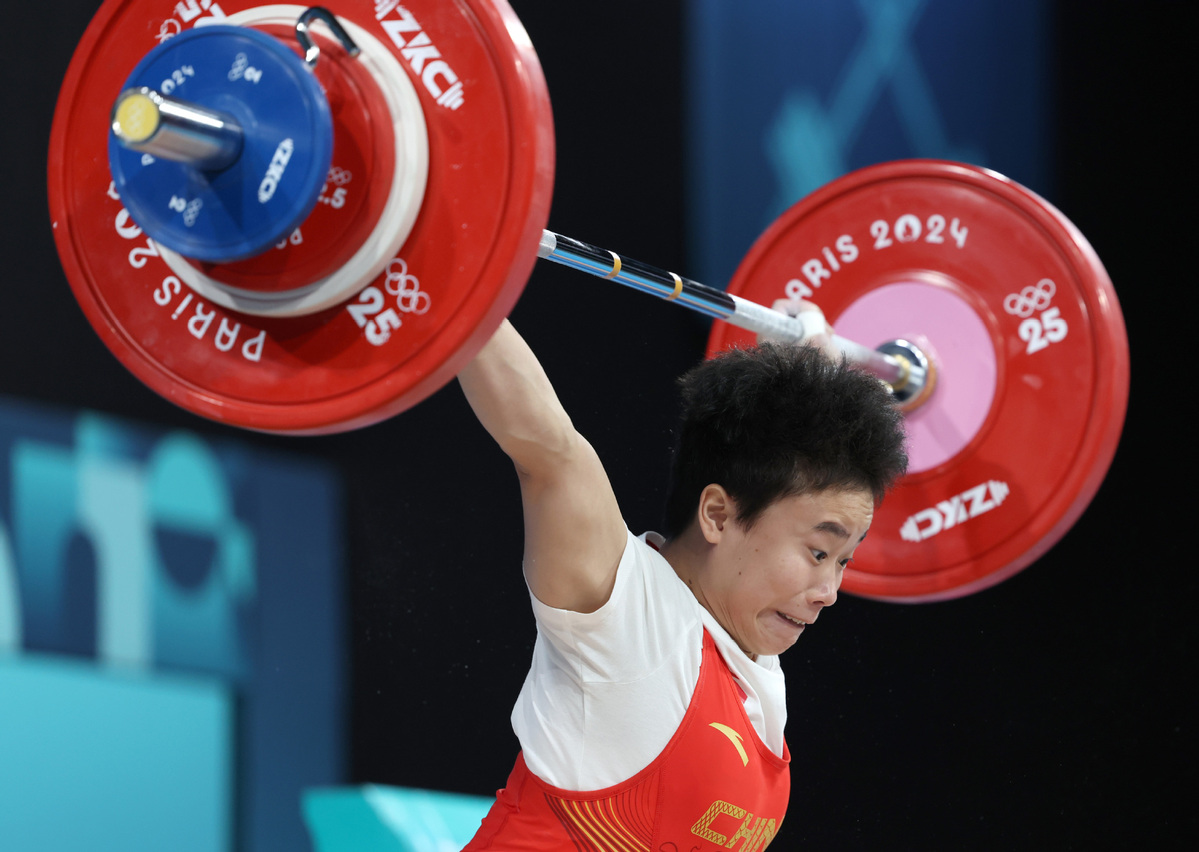
PARIS -- Chinese weightlifter Hou Zhihui defended her title in the women's 49kg division at the Paris Olympics on Wednesday.
The 27-year-old lifted 89kg in the snatch and an Olympic record-breaking clean and jerk of 117kg, achieving a winning total of 206kg.
This marks the second gold medal for the Chinese weightlifting team at Paris 2024, following Li Fabin's victory in the men's 61kg category in the afternoon.
Romania's Mihaela Mihaela Cambei took the silver medal with 205kg, and the bronze went to Khambao Surodchana of Thailand on 200kg.
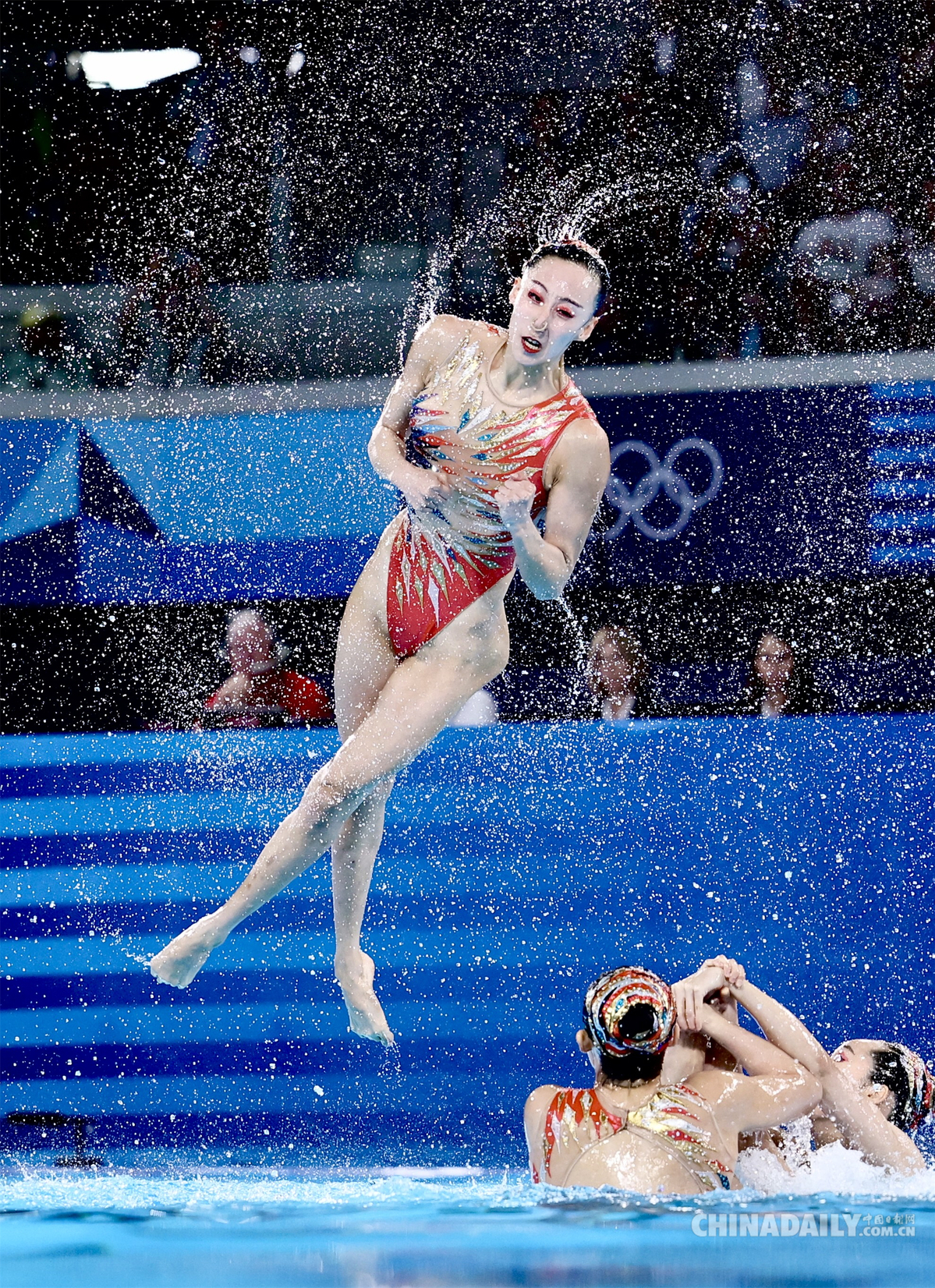
After leading in both the team technical and team free routines, China claimed its first-ever gold medal in artistic swimming at the Paris Olympic Games following the acrobatic routine held on Wednesday.
The team competition consists of a single finals phase with all 10 teams of eight swimmers performing three routines, including team technical, team free and team acrobatic, across the three nights from Monday to Wednesday. The final result, and the basis for medals being awarded, is the sum of points from all three team routines.







China's Li Fabin retained his Olympic title in the men's 61kg weightlifting division at the Paris Olympic Games on Wednesday.
Li, 31, set an Olympic record of 143kg in the snatch and lifted 167kg in the clean and jerk to go with a winning total of 310kg.
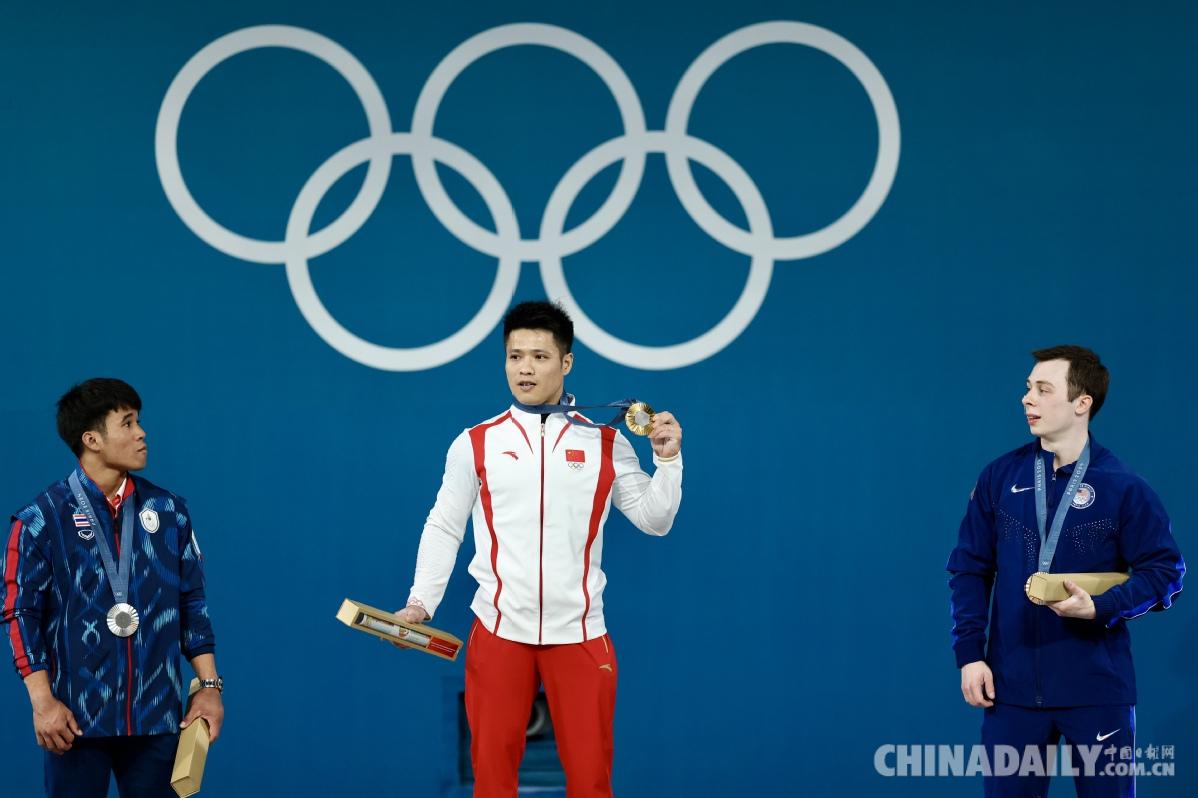
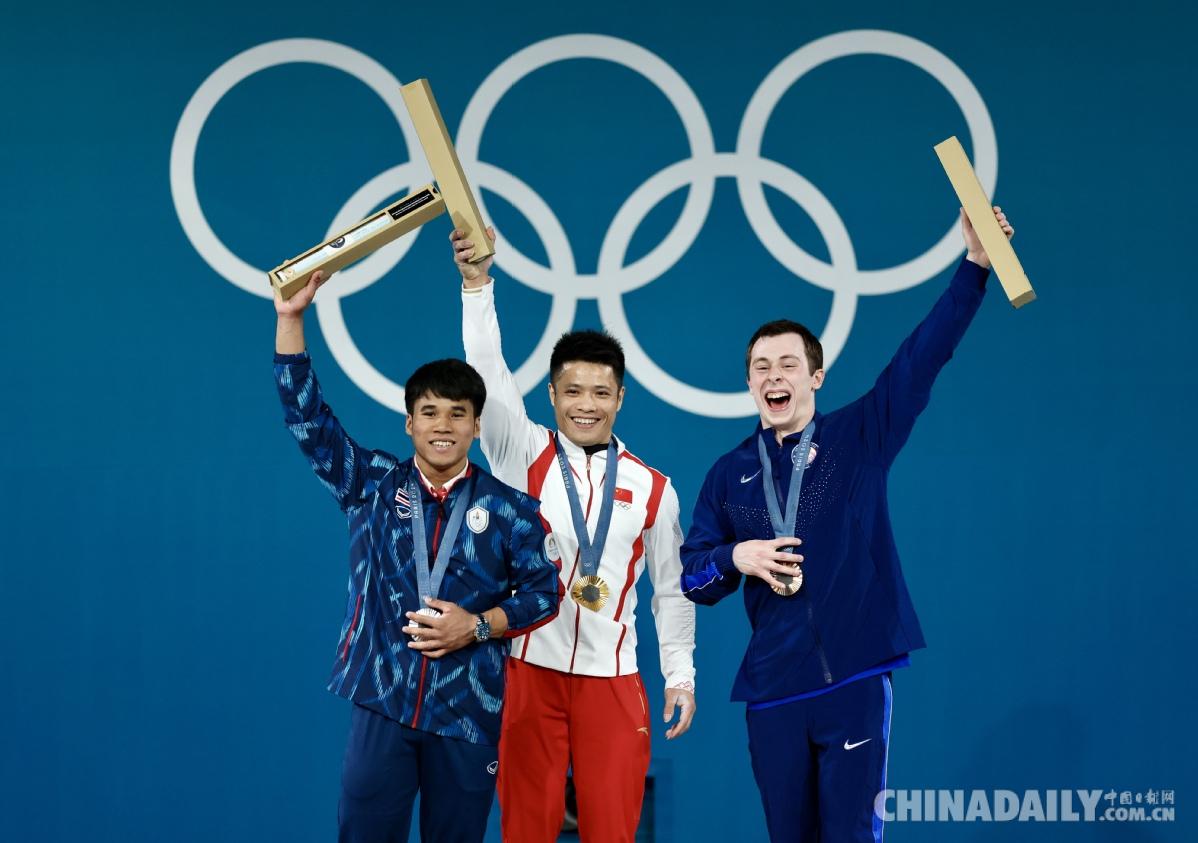
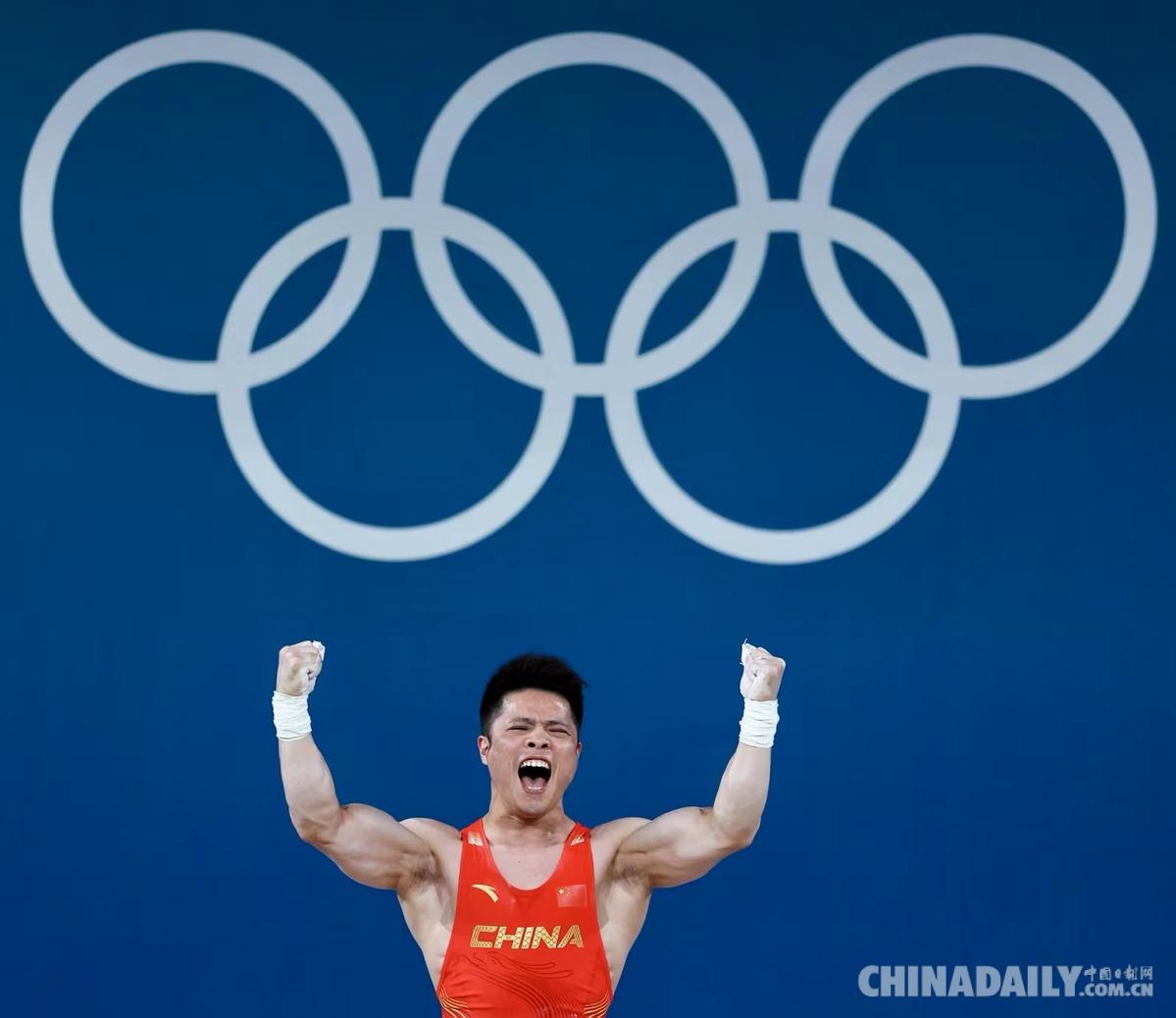
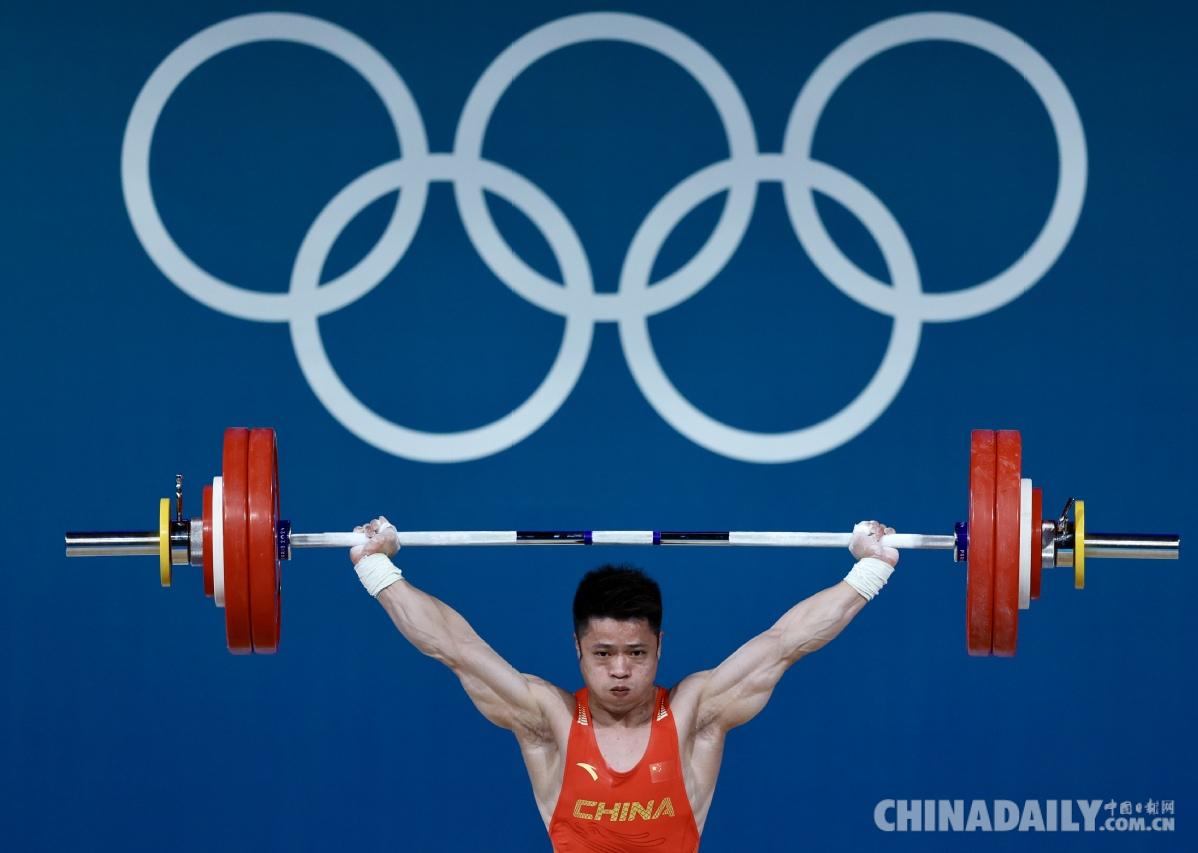
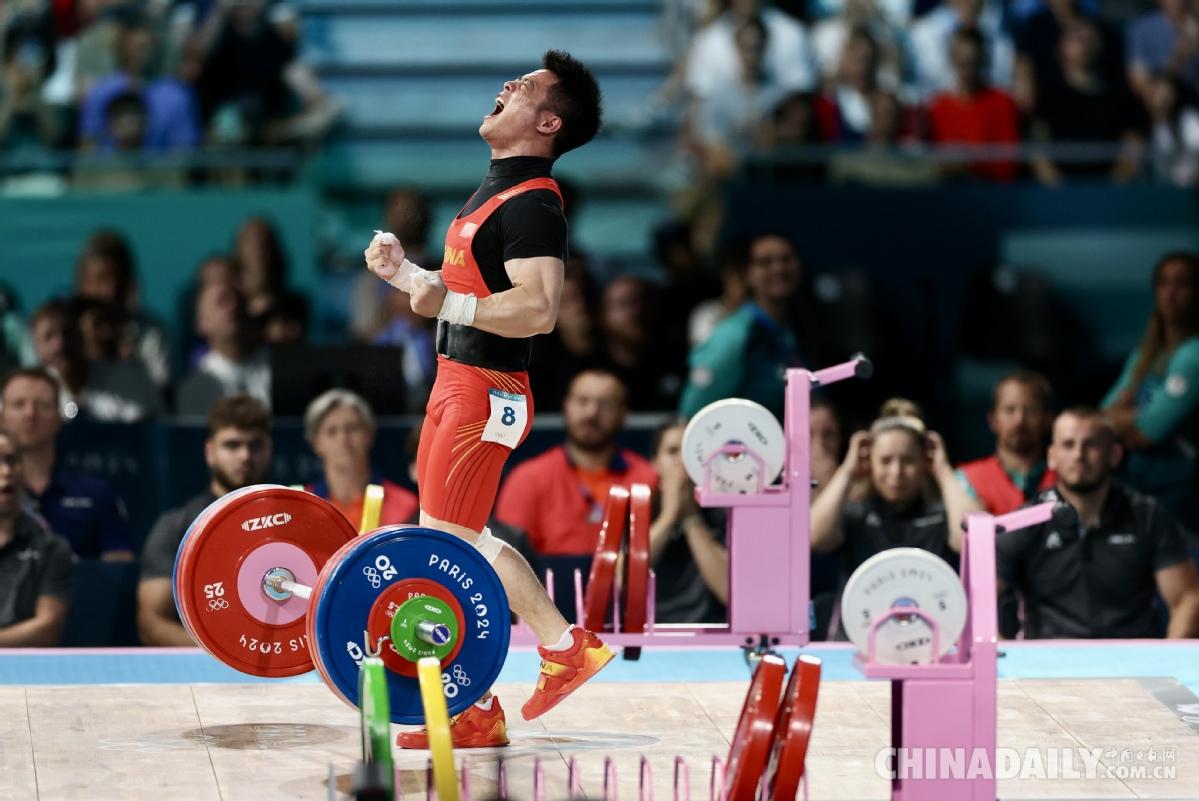
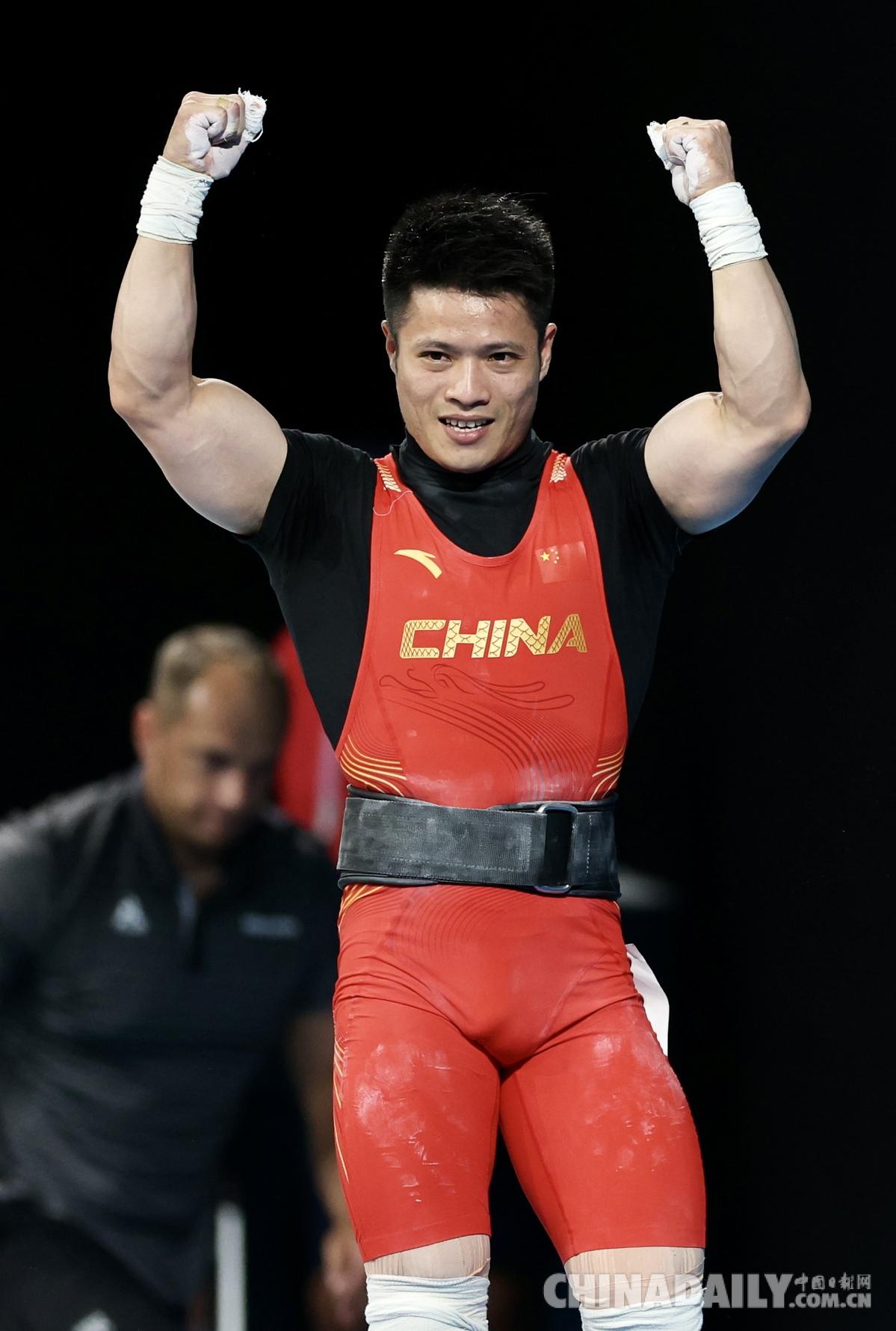
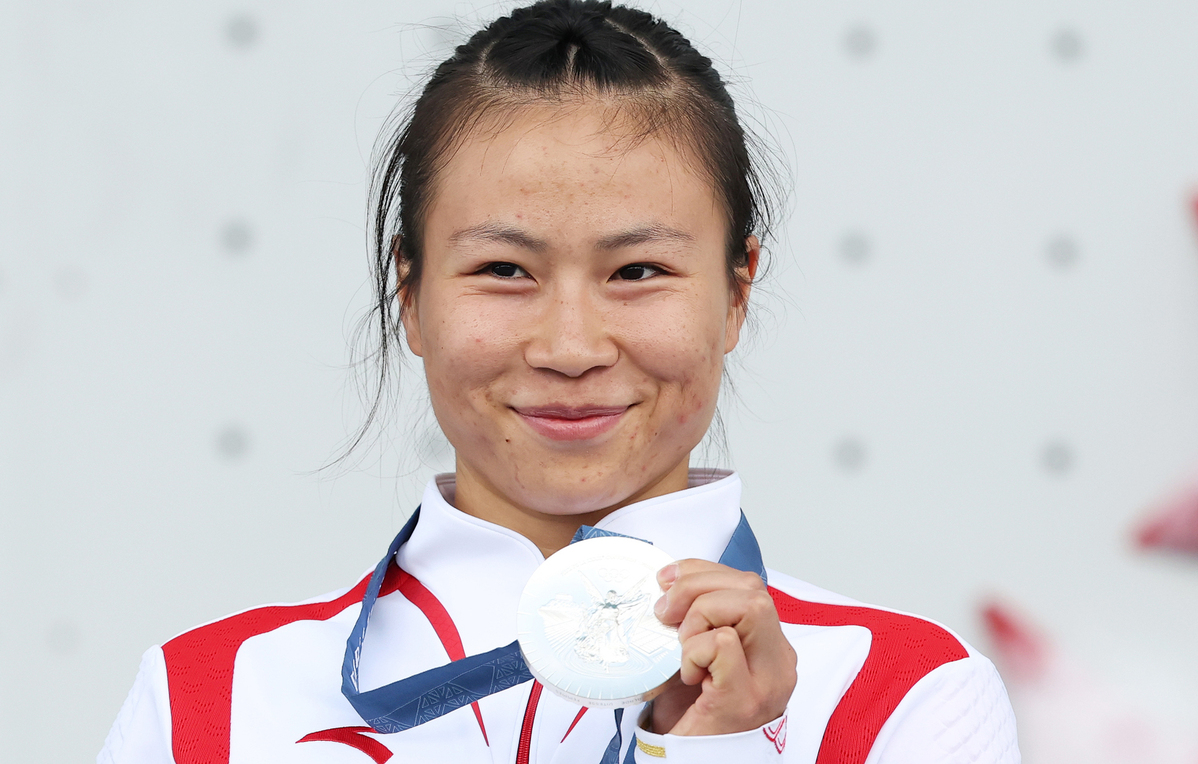
Don't blink or you will miss it. The vertical "100m sprint" has gone viral in Paris as Chinese speed climber Deng Lijuan delivered the country's first Olympic medal in the sport after a thrilling women's final.
The pressure kicked in, the frenetic crowd quieted down and, within a split second, the starting beep spurred two climbers to leap onto a 15-meter-high wall. They sprinted up the hold-studded route with hands and feet as fast as "spiderwomen" to slap the touch pad almost simultaneously before the spectators even caught their next breath.
It was sport climbing in its most captivating format, and Deng rose to the occasion to bring home a historic silver medal after narrowly losing to Poland's world record holder Aleksandra Miroslaw by a mere 0.08-second margin.
"I am really satisfied with my performance today. This event is all about challenging yourself constantly and I am so happy to see that I've improved a lot at this Olympic stage," said Deng, who touched in at 6.18 seconds, setting a new Asian record in the final at the Le Bourget Climbing Venue in northern Paris.
The speed discipline involves two climbers ascending the same routes on a wall to finish first by touching the pad in a timed one-on-one knockout format that leaves no room for even the slightest missteps.
It was the first Olympic sport climbing medal that Chinese athletes have won across two disciplines - speed and the combined boulder and lead - since the sport was first introduced to the official medal program at Tokyo 2020 as part of the International Olympic Committee's effort to bring more urban and youth dynamics to the Games.
sunxiaochen@chinadaily.com.cn

PARIS - Boxing moved to Roland Garros' iconic Court Philippe-Chatrier for the first night of finals in the competition on Tuesday as China's Yang Wenlu settled for silver against Kellie Harrington of Ireland in the women's 60kg final after falling to a split decision 4-1.
The first round saw both women go to the body, but it was the Irish athlete who looked cleaner with her punching, nullifying the Chinese movement and attempts to get on the inside.
In the close second, Yang continued to target Harrington's body and despite landing more clean shots than in the first round, she still could not convince the majority of the judges. Harrington strung together a few sharp combinations that snapped Yang's head back.
Down on the scorecards, Yang began to open up more in the third, looking for a spectacular finish to try and sway the judges or perhaps score a knockdown. Despite putting in better work, Harrington's defense mostly held firm.
Despite winning over the majority of the judges with her work in the final round, Yang could not secure the big punch or moment to swing the score in her favor. The scores of 29-28 on all the scorecards, with one scored in Yang's favor, reflected the closeness of the fight. On another day and with another set of judges, Yang might have scored better in the second and most pivotal round. However, Yang was unable to land enough clean shots to the head of the Irishwoman to convince the judges.
China's number one seed Wu Yu defeated Nazym Kyzaibay of Kazakhstan in the women's 50kg semifinal via a comfortable split decision 4-1. In the first round, Kyzaibay fought on the front foot, advancing towards the Chinese, who was forced to fight off the back foot. Despite this, Wu was able to land a sweet right, straight counter after using sharp footwork to back off the ropes and throw on the exit. Wu's superior skill gave her the first round on four of the five judges' scorecards.
Kyzaibay became more desperate in the second, forcing the clinch to try and get a hold of the Chinese fighter, who was too fast and too fluid in her movement around the ring. Coming out in the third, the Kazakh required a knockdown or a very unlikely finish to secure the win with Wu already clearly ahead on three of the five scorecards. Despite a flurry of activity and shots at the start of the third, Wu was able to easily weather the storm and coast to the victory.
Wu will face Türkiye's Buse Naz Cakiroglu after she defeated Aira Villegas from the Philippines in the other semifinal.
China's Yang Liu came back from a poor first round to defeat Chinese Taipei's Chen Nien Chin in a split decision 4-1. Chen started more aggressively of the two, forcing Yang to retreat. The clinch-heavy first round was won by Chen on all the scorecards. In the second, Yang grew into the bout and began to land more shots in the clinch as well as catching Chen on entry. With everything to fight for in the final third round, both women increased their volume, but it was Yang who was more crisp and landed more consequential strikes.
Yang will face Algeria's Imane Khelif in the gold medal match. Backed by vociferous Algerian support, Khelif, who had been the "unfair" subject of controversy earlier in the tournament, won by unanimous decision against Thailand's Janjaem Suwannapheng. Although the Thai had superior speed, Suwannapheng could not overcome Khelif's superior strength and size, who won every round with every judge.
In the men's 71kg semifinals, American Omari Jones fell to Uzbekistan's Asadkhuja Muydinkhujaev in a split decision 3-2. The Uzbek southpaw fought on the outside and looked to counter the more aggressive American, using his footwork and fighting at range.
In the other semifinal, Marco Verde of Mexico defeated Lewis Richardson of Britain via split decision 3-2.
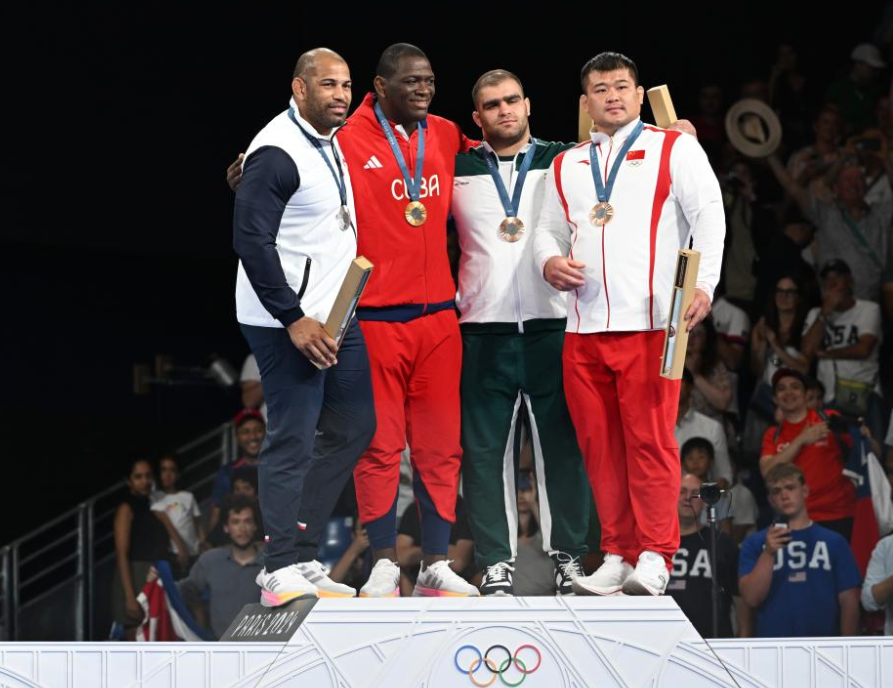
PARIS - Cuba's Mijain Lopez Nunez made history with his gold medal in the men's Greco-Roman wrestling 130kg final, becoming the first person to take five Olympic gold medals in the same event.
In the final, Lopez Nunez decisively defeated Chile's Yasmani Acosta Fernandez by a score of 6-0. He is regarded as a legend in wrestling worldwide. After the match, he left his wrestling boots on the mat, symbolizing his retirement.
"I'll be retiring; it's over. We need to make some space for the newcomers. Wrestling has been the love of my life, all my life," he remarked.
In the bronze medal matches, China's Meng Lingzhe and Iran's Amin Mirzazadeh came out on top of their opponents to clinch medals.
Earlier in the day, China's Cao Liguo was defeated by Japan's Kenichiro Fumita in the men's Greco-Roman wrestling 60kg final, settling for a silver medal, equaling China's best Olympic wrestling result.
China's previous top achievement in men's wrestling at the Olympics was Chang Yongxiang's silver medal in the men's Greco-Roman wrestling 74kg at Beijing 2008.
Reflecting on his match, Cao said, "It's tough to lose after preparing for so long. There's certainly some disappointment, but performing at my training level is what really matters."
Kyrgyzstan's Zholaman Sharshenbekov and the DPR Korea's Ri Se-ung shared the bronze medals.
In the women's freestyle wrestling 68kg final, which concluded the day's events, the United States' Amit Elor captured the gold.
Meerim Zhumanazarova of Kyrgyzstan secured the silver, while Turkiye's Buse Cavusoglu Tosun and Japan's Nonoka Ozaki shared the bronze medals.

PARIS - Zhao Jie's bronze medal in the women's hammer throw at the Paris Olympics on Tuesday marked China's fifth consecutive podium finish in the event.
Zhao produced a best throw of 74.27 meters to finish behind gold medalist Camryn Rogers of Canada (76.97) and American Annette Echikunwoke (75.48), who took silver.
"Happy, proud, emotional," Zhao replied when asked how she felt about her performance. "I thought about this before today, about winning a medal, but I only thought about it in my heart."
China's run of success in the event dates back to the Beijing 2008 Games when Zhang Wenxiu claimed silver. Zhang also took the bronze medal at London 2012 and another silver at Rio 2016 before Wang Zheng clinched silver at Tokyo 2020.
"Yes, and we all were taught by the same coach," Zhao said. "I thought to myself, I must work hard, I mustn't disappoint everyone. I've made it."
The 21-year-old reflected on a final that was "wide open" at the Stade de France.
"Last season, 77 meters might have only gotten you second place," she said. "Today, if you threw 77 meters, you would've been guaranteed gold. But I probably didn't have that in me today anyway. I just aimed for breaking a personal best. I got close, still about a meter away."
Zhao led at one point during Tuesday's competition but was unable to improve on her distance when Rogers and Echikunwoke raised the standard.
"My competitors were sure to make a strong surge," she said. "I wanted to go for better too. But maybe that throw might have given them a scare."

Denmark's Viktor Axelsen said he "felt like the king of the court" after retaining his Olympic badminton title in front of his country's monarch in Paris on Monday.
Backed by a vocal crowd at La Chapelle Arena and watched by Denmark's King Frederik X, Axelsen demolished world champion Kunlavut Vitidsarn of Thailand 21-11, 21-11 in 52 minutes.
The lanky Dane became the first man to successfully defend the Olympic men's singles title since Chinese great Lin Dan, who won in 2008 and 2012.
Axelsen said that winning in Paris meant more than his first gold in Tokyo, where he clinched the title in a largely empty venue because of COVID-19 restrictions.
"This feeling right now means more to me, because my wife and our two daughters were in the stands," said the 30-year-old.
"I am so proud that I have performed in front of the king of Denmark. I'm just over the moon right now.
"Today I felt like the king of the court," he added.
Axelsen also won bronze at the 2016 Rio Games, giving him a bigger haul of Olympic medals than the legendary Lin.
The Dane brushed aside suggestions that he had reached the same level as the Chinese player, calling him the greatest of all time.
"For me he is the GOAT, and I'm just very happy and proud to be, in Olympic terms, on the same level," Axlesen said of Lin, who was also present in the arena. "But, in my eyes, he stands as the best ever."
Kunlavut's silver was Thailand's first-ever Olympic medal in badminton. It was also its first medal of the Paris Games.
Kunlavut, who was seeded No 8 to Axelsen's No 2, said the Dane was "very difficult to play against".
"Everything he does is very good, but for me it's OK," said the 23-year-old. "It's my first time at the Olympics and I got to the final, so I'm very happy."
Kunlavut made a good start, but Axelsen soon settled into his rhythm and built up a commanding lead in the first game.
He closed it out in 24 minutes, raising his hand in apology after winning the game with a shot that hit the net tape and flopped over.
Axelsen was again unstoppable in the second game, unleashing the full force of his 194-centimeter frame to rain down smashes.
After clinching the title, he grabbed a Danish flag and tore around the arena.
"To be honest I didn't even know how I would like to celebrate when I won, because I was so focused on winning," said Axelsen.
"I was so focused on being calm and playing the right shots."
Malaysia's Lee Zii Jia took bronze after beating India's Lakshya Sen 13-21, 21-16, 21-11.
China topped the badminton medals table for a seventh straight Olympics, winning golds in the mixed and women's doubles.
Chinese Taipei won men's doubles and South Korea's An Se-young took gold in women's singles.
AFP

Sweden's Armand Duplantis improved his own world record en route to retaining his Olympic pole vault title in Paris on Monday.
In a sensational finish to the fifth day of track and field at the Stade de France, Duplantis sailed over the bar, raised to 6.25 meters, to rapturous applause from a 69,000-capacity crowd.
It bettered by 1 cm his own previous best of 6.24m set at the Xiamen Diamond League meet in April.
Remarkably, it was the ninth time the US-born Swede has broken the record.
In the competition before the procession, American Sam Kendricks won silver with a best of 5.95m, and Greece's Emmanouil Karalis took bronze (5.90) on countback.
The gold meant Duplantis became the first man to retain the pole vault title since American Bob Richards in 1952 and 1956.
It had been, he said, an "out-of-body experience".
"What can I say? I just broke a world record at the Olympics, the biggest possible stage for a pole vaulter," said Duplantis.
"The biggest dream since I was a kid was to break the world record at the Olympics, and I've been able to do that in front of the most ridiculous crowd I've ever competed in front of."
As soon as he crashed down on the landing mat after his third and final successful attempt at 6.25m, Duplantis bounced away on the track to embrace family and friends in the stands.
Draped in the Swedish flag and with Abba's "Dancing Queen "booming around the stadium, Duplantis made an emotional lap of the track.
The music halted as he leaned down to ring the victory bell, capping yet another exceptional display from the irrepressible 24-year-old.
Competition opened amid perfect, balmy conditions with the bar at 5.50 meters. Duplantis skipped that, all of his 11 opponents opting, successfully, to make an attempt.
The Swede came in at 5.70m, sailing over with no problem. He skipped 5.80m, by which time four athletes had dropped out.
Field narrowed
Duplantis then cleared 5.85m in his second vault of the night by a considerable margin.
Kendricks followed suit, and the pair then went over at 5.95m.
That proved too much for the rest of the field, as Australian Kurtis Marschall, Turkiye's Ersu Sasma, Ernest John Obiena of the Philippines and Karalis all fell by the wayside.
Karalis took bronze on a 5.90m countback from Obiena, but passed on 5.95.
The bar was raised to 6.00m. First up was Kendricks, but he brought down the bar. Duplantis followed and made no mistake, to the delight of a raucous crowd at France's national stadium.
"Mondo (Duplantis) is an extraordinary jumper because of four factors," said Kendricks, who finished second. "One, he's had a great coach for a long time. He's had a lot of time to do it. He's got great equipment and understanding of the event.
"He's a fan of the sport, and he's got God's hand on his back."
Kendricks had two more failures, leaving just Duplantis in the competition.
The bar was immediately raised to 6.10m, which, again, posed no problem for the Swede.
Theater and dreams
When it comes to delivering great theater, Duplantis showed once again, that he is in a class of his own.
The crowd erupted as the in-track panels flashed up the next height: 6.25m, a world record mark.
His first effort was very close, catching the bar with his elbow.
Following his first miss, he used the break while Noah Lyles was receiving the gold medal for his 100-meter victory, to study video on a tablet with his parents, who met decades ago, while they were both on the LSU track and field team.
For his second attempt, Duplantis asked for the crowd, in unison, to perform the slow clap made famous by supporters of Iceland's football team.
Another miss ensued, then another long break.
There were no demands for the third, just total concentration.
The fans clapped in rhythm and sang along to the French song Alleur de Feu — Light the Fire — getting ready for Mondo's leap into history.
"I tried to clear my thoughts as much as I could," Duplantis said.
"The crowd was going crazy. It was so loud in there, it sounded like an American football game. I have a little bit of experience being in a 100,000-capacity stadium, but I was never the center of attention.
"I was just trying to channel the energy everybody was giving me, and they were giving me a lot of it. It worked out."
As he accelerated down the runway, yellow pole held aloft, the crowd bayed. Successfully planted, the pole flexed and up shot Duplantis — body bending so his feet went up first — into the night air. The stadium held its breath, then came the explosion of noise delight at another world record and a second Olympic gold bagged in a memorable night's work.
"I felt very confident going into today," he said. "I really wasn't all that nervous. I've never been so locked in my life than in these past three months. Now I'm just ready to eat a bunch of food."
And indeed, the celebrations were not likely to end there.
"I started a tradition a few years ago, when Mondo became so hard to beat," said Kendricks. "The winner buys dinner. Mondo won by a lot tonight, so he's going to buy us dinner."
Duplantis added: "The party is going to be pretty big. Not that much sleep, a lot of partying, a good time."
Greatest ever?
By winning a second straight gold medal and breaking the record for the ninth time — each time by one centimeter — Duplantis is now next to, if not above, Sergei Bubka as the greatest ever in this event.
Duplantis is in the conversation alongside America's Ryan Crouser, a world-record holder and three-time gold medalist in shot put, when it comes to the most dominant athletes in their discipline.
A literal home-grown talent, Duplantis learned this sport on a pole vault pit his parents dug in their backyard in Lafayette, Louisiana.
During long afternoons of jumping in that pit, Duplantis often envisioned himself going for a world record on his last jump at the Olympics.
"For it to actually happen the way that it did, and for me to put the right jump together at the right time, it's bigger than words for me."
Agencies
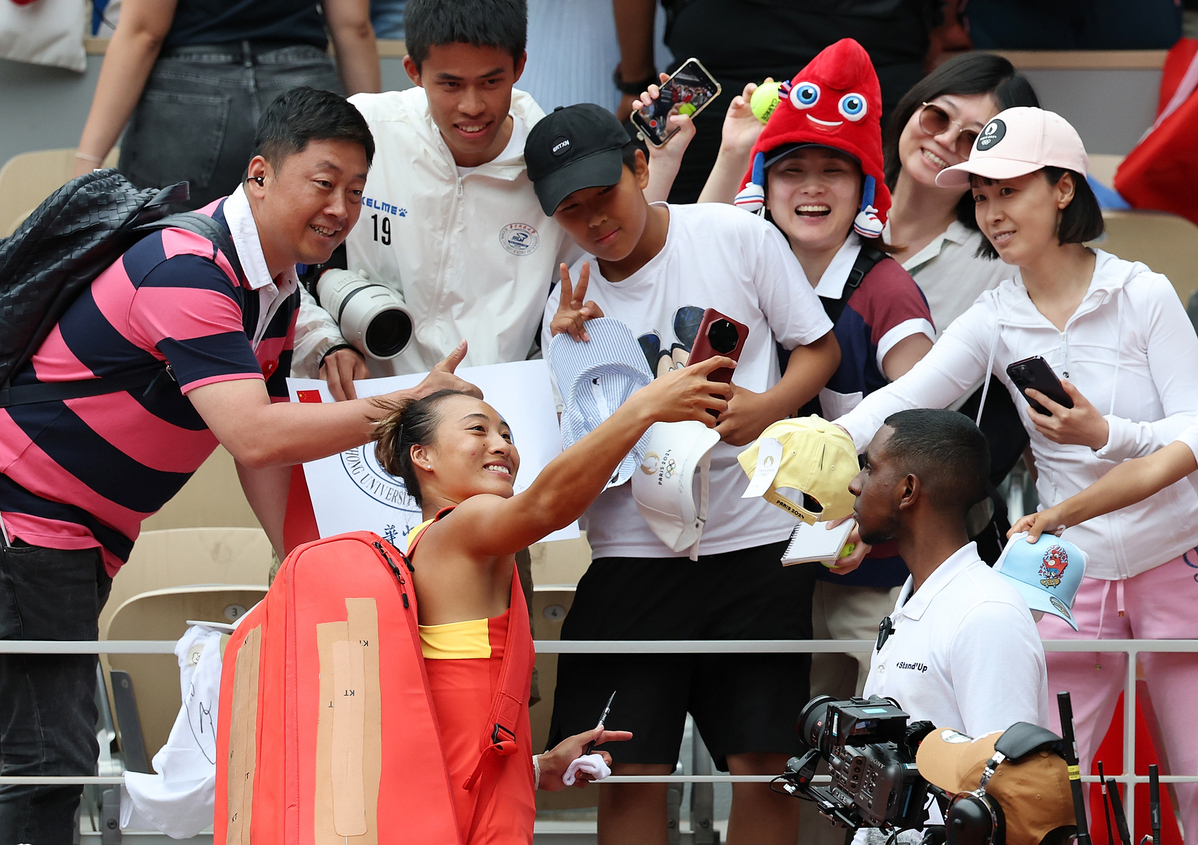
Girls who love to laugh usually have good luck, and the same goes for those who are disciplined. While her peers were savoring the latest bubble milk tea and dessert trends, 21-year-old Zheng Qinwen spent 360 days a year sticking to a strict, bland diet.
In more than a decade of rigorous training, Zheng never slacked off. She was always the first to arrive and the last to leave. This summer, that discipline has paid golden dividends in Paris.
On Saturday, Zheng dazzled at Roland Garros, winning the women's singles Olympic gold in emphatic fashion — the first-ever for an Asian athlete.
In the climactic moment, when the winning shot landed, she dropped her racket as she collapsed backwards onto the red clay and raised her arms in triumph, soaking in the thunderous cheers ringing out around Court Philippe-Chatrier.
"Actually, at match point, I could feel my hands trembling, but my focus remained intense, as I concentrated on executing the next shot. When I finally won the match, I had not only conquered the pressure, but also surpassed my own limits," Zheng said.
Once nicknamed "Fire", she has now perfected the art of balancing her hot-headedness with patience — blending "water" and "fire" — on the court, mastering the skill of channeling her energy with precision. This newfound poise has not only earned her greater success, but also the title of "Queen Wen "among her fans.

"I love my fans for giving me this title, honestly, because it fits my character well: You need to present yourself as queen of the court, because you need this energy, this power to show that you are the best," Zheng said.
"I remember before, when something bad would happen, or there would be a tough moment, I would struggle and get panicked. I could not find peace in my heart. But, right now, as you can see in this Olympic Games, when I'm 1-4 down, 0-4 down, I find a way to come back during the match," she said. "There is fire and there is water at the same time."
Zheng attributes her success to her family's unwavering support and the many sacrifices her parents have made along the way.
"They taught me how to be disciplined and to stay focused on my dream. Most importantly, they always believed in me and the heights I could reach. I want to thank them for that," she said.
Team family
Born in 2002 in Shiyan, Hubei province, Zheng was encouraged by her father, Zheng Jianping, a former track and field athlete, to explore various sports from a young age, including basketball, badminton, running, and even two years of table tennis. However, it was tennis that she truly fell in love with.
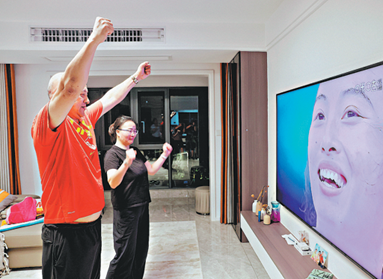
Zheng Qinwen describes her passion for the sport's "expansive space" and constant demand for strategic decision-making.
"It's not about who is stronger, more powerful or faster. Every decision you make on the court can change the outcome of the match," she explained.
At eight years old, Zheng Qinwen was sent to Wuhan, 200 kilometers away, to train — only seeing her parents every two weeks. She later moved to Beijing for further training and, at 14, ventured alone to Europe and the US to perfect her game.
Through it all, Zheng Jianping has been a pivotal figure in her career, serving as her earliest nutritionist, physiotherapist, and coach. Her mother has consistently supported Zheng during her training, providing essential daily care and emotional support.
Zheng Qinwen recalled that her father has always had faith in her, regardless of whether she wins or loses. "When I was 12, he said that, one day, I'll become a Grand Slam champion. Even when I have some tough losses, he always believes."
"My mom is always there taking care of my mental health, and my body. My father and mother, they work as a team," she said.
The team's efforts have been richly rewarded. Zheng Qinwen has made steady and impressive progress. Turning professional in 2018 at the age of 16, she quickly established herself on the junior circuit, reaching a world junior ranking of No 4.
In 2020, she embarked on a journey through Europe playing in ITF tournaments, starting with a world ranking of over 600. In just over three years, she has soared to a career-high ranking of No 7.
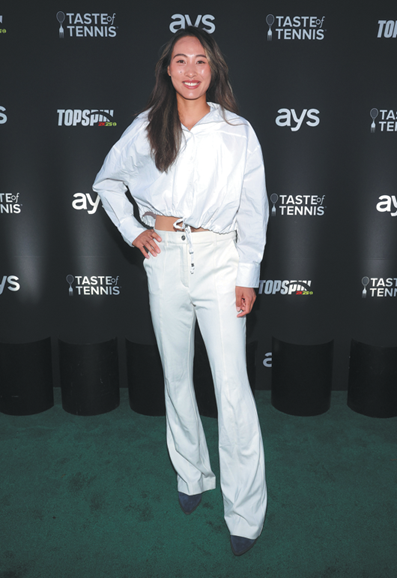
National glory
When Zheng Qinwen was six years old, her father took her to Beijing to watch the Olympic Games. From the stands, she watched on as Li Na reached the semifinals.
Little did she know that, 16 years later, she would surpass Li by securing China's first-ever tennis singles gold.
Despite a challenging season, following her appearance in the Australian Open final in January, Zheng Qinwen appeared transformed when she stepped onto the Olympic stage.
"You can see the hunger I have in this tournament — in my behavior, my eyes — the hunger I have is different than in all the other tournaments I play," she explained.
The pressure of representing China fueled her with extra motivation and energy. Facing fierce opponents, she persevered through a gruelling schedule as she forged a path to victory. She overcame deficits against No 15-ranked Emma Navarro of the United States, German former world No 1 Angelique Kerber and current No 1, and Roland Garros specialist, Iga Swiatek.
"There was a spirit holding me up. I just felt like never giving up during the games," she said. "I don't know why, because in a tour match, maybe I'd let it get away. At the Olympics, I just held on to it and kept fighting."
Before her match, Zheng Qinwen watched the gold-medal performance of China's former 110m hurdler Liu Xiang at the Athens 2004 Olympics. Something she did repeatedly in the days leading up to her own final.
"He mentioned that, in 2004, he won gold at 21, at the peak of his career. I thought to myself, I'm 21 now, too. Exactly 20 years later, I am standing on this stage, and I can do it, too," Zheng Qinwen revealed.
Now, it will be her heroics that inspire a new generation.
"I want to tell them: 'Dream big. Be brave and dream. But, don't forget that there will be tough challenges, doubts, tears and failure, but you must enjoy the process. All the losses are for that one moment of success'."


CHATEAUROUX, France - British shooter Amber Rutter's journey to a silver medal in women's skeet at the Paris Olympics is a testament to her resilience and determination.
Competing at the highest level of sport is challenging enough, but doing so just three months after giving birth adds an extraordinary layer to her achievement.
The 26-year-old was tied at 55 hits with Francisca Crovetto Chadid of Chile in Sunday's final and fell short six to seven in the shoot-off after her last shot was called miss.
Despite the controversy over whether she hit her last target, Rutter remained positive about her performance.
"That's the way the sport goes. I truly believe that I did hit that last target. But to come away with the silver medal, it's something I'm so proud of," she commented.
Rutter's Olympic journey was marked by intense emotions and the unique challenges of balancing motherhood with training after giving birth to her son Tommy in late April.
"I wish I could say it was easy, but it was really hard just dealing, battling with those nerves," she confessed. "It has honestly been a crazy few months and really tough balancing life with a newborn and fitting in training and everything else going on in my life.

"It's been a real challenge, but with the support of family and friends and British Shooting, everyone has chipped in to really encourage me that my Olympic dream has not been forgotten about. It was important I kept reminding myself that my goal was to get to the Olympics."
The culmination of her efforts brought unparalleled joy, especially when she discovered after the competition that her husband had come with their son to surprise her.
"To turn around and then see my son there and my husband, I can't believe that. He completely surprised me. I had no idea he was coming," said the new mom, who had asked her family not to come for her match.
"I know Tommy might not remember it, but it's a moment that I'll certainly remember," she added.
For Rutter, juggling motherhood and Olympic training has been both a physical challenge and an inspiring experience. She aspires to encourage other mothers with her story.
"I just hope that we can really share the message to other moms that your life doesn't stop after having a baby," she said. "Whether it's in sport or whatever passion you have, your life just doesn't have to stop. They just have to come along with the ride with you."
Rutter also saw the silver medal a tribute to her late grandfather, Bill Rogers, who introduced her to shooting.

"He was the one that really got me into the sport," she recalled. "He came to Rio with me and unfortunately passed away a few years later due to cancer. But even when he was really sick, he always had the iPad up and watching me every moment wherever I was in the world. He was there with me every step of the way, and his dream was to see me win an Olympic medal. "
"Although he may not be here today, I know he will be watching up there, and this is for him as well," she said.
Rutter's maiden Olympic medal could have come earlier, when she was entering the Tokyo Olympics as reigning world champion. However, she was forced to withdraw from the Games after testing positive for COVID-19 the night before flying to Japan.
"After the disappointment of Tokyo, I wanted to quit altogether. I only carried on competing to get a roof over my head and pay the bills," she revealed.
"To come back now and secure a silver medal feels like everything was meant to happen this way. It's been a rollercoaster, but now I have got this medal with my son here, I truly believe things happen for a reason. It just hasn't sunk in yet."
Speaking of the next Olympic Games in Los Angeles, Rutter said she has not yet planned her future so far ahead but is focused on celebrating her success and spending time with her family.
"I've got so many things in my life right now and being a mom. I feel like I've just been so busy these last few months. I just really want to focus on family time and starting my business."
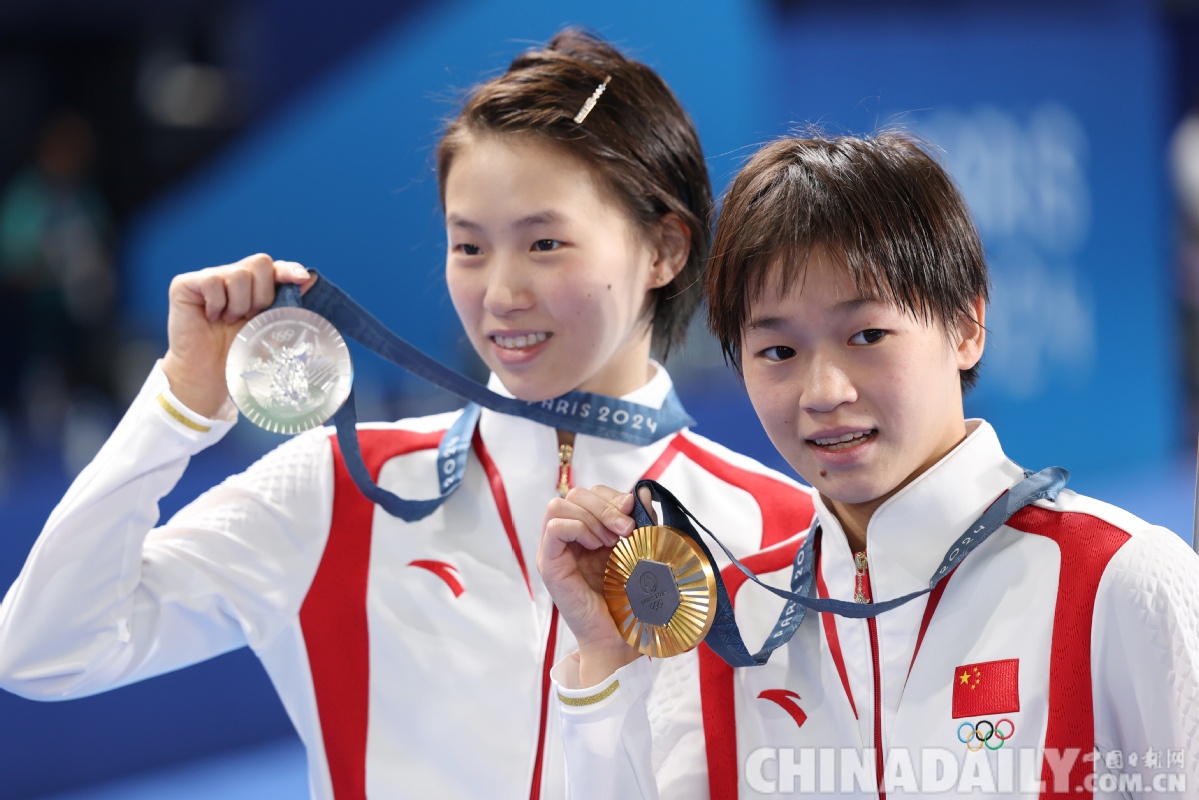
Chinese diver Quan Hongchan triumphed in the women's 10-meter platform diving event on Tuesday at the Paris Olympics, defending her title in the event, claiming her second gold medal at the Paris Games and securing China's 22nd gold medal overall.
Quan's teammate Chen Yuxi won silver, and Kim Mi-rae of the Democratic People's Republic of Korea won bronze.
Quan and Chen had also won the gold medal in the women's synchronized 10m platform on July 31.
Before Tuesday, the Chinese delegation had already amassed 21 gold medals, 18 silvers and 14 bronzes in the first 10 days of the Paris Games. Amid fierce competition, there have been remarkable breakthroughs as well as results that fell short of expectations.
The shooting events, now completed, have been especially rewarding for China, with Generation Z athletes Huang Yuting and Sheng Lihao sparking the gold rush for the Chinese team. China achieved a historic best in shooting with a total of five golds, two silvers and three bronzes.
In swimming, the Chinese team started slowly but gained momentum, securing two golds, three silvers and seven bronzes. With 12 medals total, the team doubled its count from the Rio and Tokyo Olympics, and 22 more athletes stood on the podium compared with Tokyo.
The biggest surprise came from 20-year-old Pan Zhanle, who shattered his own world record in the men's 100m freestyle final with a time of 46.40 seconds to win gold. He then clinched another gold with his teammates in the men's 4x100m medley relay.
Zhou Jinqiang, vice-president of the Chinese delegation, highlighted the significant impact of the Chinese swimming team at this year's Games, which challenged the dominance of European countries and the United States.
"Pan is the first Asian athlete to win the men's 100m freestyle Olympic gold medal since the 1932 Los Angeles Olympics," Zhou said.
He noted that netizens have compared Pan to Jamaican sprinter Usain Bolt, saying "the Bolt on land, Pan Zhanle in the water", which Zhou said underscores "the significance of this gold medal".
Zhou also said that the gold medal in the men's 4X100m medley relay reflects the team's overall strength, breaking the US'40-year dominance in the event. And although the Chinese mixed 4X100m medley relay team won silver, they still broke the world record, showcasing the balanced and comprehensive development of Chinese swimming.
Additionally, swimmer Zhang Yufei won a total of six medals (one silver and five bronzes) at this Olympics, making her the Chinese female athlete with the most medals in a single Olympic Games. She now has won a total of 10 Olympic medals, making her the most decorated Chinese Olympian.
China has also achieved remarkable results in several events, including women's BMX and women's singles and mixed doubles in tennis, and it narrowly missed gold in team events in men's gymnastics and women's archery.
Zhou, the Chinese delegation's vice-president, highlighted the intense competition of the Olympics, noting that athletes face enormous pressure, resulting in an error rate that is higher than in other competitions.
"Winning and losing are both normal outcomes," he said. "Therefore, I call for understanding and compassion for athletes who make mistakes or fail to meet expectations during the Olympics."

As China's national diving team continues its gold rush at the Paris Olympic Games, its artificial intelligence training system is making a big splash in the field of sports innovations.
Developed by Chinese tech giant Baidu, the training system has "sharp eyes and a strong brain", said Lu Feixiang, a senior engineer at the company's research institute.
The system captures intricate details of diving movements that traditional video systems cannot, provides immediate feedback and real-time analysis, and allows performances to be compared in detail with the previous best one.
The technology is just one example of how AI is permeating the Paris 2024 Games, referred to by some as the "first AI Olympics" due to the extensive use of AI in training, refereeing, broadcasting and even anti-doping measures.
"Diving involves executing complex movements within a brief 1.8-second window, from the jump to entering the water," Lu said. "Perfecting every detail is crucial for Chinese athletes' famed splashless dives."
Traditional video recording falls short in capturing rapid sequences, and the subsequent data analysis is time-consuming and less immediate.
Based on Baidu's ChatGPT-like product and large language model Ernie Bot, the AI system addresses these challenges by offering clear, accurate, comprehensive insights, advancing data quantification and analyzing the dives, Lu said.
"The AI system allows for timely playback and scoring. I use it to refine my technique," Quan Hongchan, who won the women's synchronized 10-meter platform diving event with her teammate Chen Yuxi, said before the competition.
Chen said, "AI can break down movement details, helping me master the nuances of timing and entry control."

Transformative event
AI and technology innovations are transforming the Paris Olympics with applications ranging from training athletes to enhanced broadcast experiences to efficient energy management.
The International Olympic Committee recognized the transformative potential of AI in the "Olympic AI Agenda" report published in April. The IOC said it aims to adopt a "holistic approach to explore the great potential of AI, while mitigating the risks".
The agenda sets out a list of AI goals that focus on optimizing the Games, detecting talent, and reducing human bias. Many of these applications are being tested for the first time in Paris.
Thomas Bach, the IOC president, emphasized the importance of using AI to safeguard athletes from cyber abuse, with around half a billion social media posts anticipated during the Paris Games. In addition, AI is being used to create highlight videos in multiple formats and languages, he said in a statement.
"We are also using AI to make the Olympic Games more sustainable, through a very sophisticated first-ever data capture and energy management system. AI is also opening up new ways for talent identification, and this project will be launched by us globally in 2025 to live up to the commitment we made that AI in sport must be accessible to everybody," Bach added.
The market for use of AI in sport is projected to grow from $6 billion in 2024 to $21 billion by 2029, with a compound annual growth rate of 28.69 percent, according to market research company Mordor Intelligence.

Boost for brands
The growth potential is reflected in Paris, where Chinese tech companies are leveraging their cutting-edge cloud computing and AI tools to enhance live broadcast experiences and athletes' performances.
"For Chinese companies with global strategies, having a marked presence at the Olympics can be a vital accelerator to boost brand influence and international development," said Jiang Han, a senior researcher at the Beijing-based think tank, the Pangoal Institution.
"This is a once-in-a-four-year opportunity for Chinese companies to showcase their latest innovations to the global audience, and mirror their technological prowess," Jiang added.
Chinese tech giant Alibaba Cloud, for instance, is replacing traditional satellite methods by using its advanced technologies to support over two-thirds of the event's broadcasts. These technologies are improving internal workflows, enhancing the viewer experience, enriching storytelling, and helping better explain some sports.
Alibaba Cloud has provided a record number of multi-camera replay systems with AI-powered, high-quality reconstruction in the cloud, to create three-dimensional models and mapping of additional viewpoints of 21 sports and disciplines. This helps deliver more compelling replays from more camera angles.
The "bullet time" multi-camera replay system, an AI-enhanced broadcasting technology developed by Alibaba Cloud, provides viewers with cinematic effects, including slow-motion and freeze-frame views, offering an immersive experience. This technology is deployed at 12 venues, covers sports including beach volleyball, tennis, judo, and rugby — and delivers high-quality replays from multiple angles.
Yiannis Exarchos, CEO of the IOC's subsidiary Olympic Broadcasting Services, oversees the distribution of event coverage. To improve efficiency for broadcasters, Alibaba Cloud launched OBS Cloud in conjunction with OBS in September 2018, and supported the broadcast coverage of the Tokyo 2020 Summer Games and the 2022 Beijing Winter Olympics, he said.
For media rights holders and host cities, OBS Cloud is a more cost-effective alternative as Olympic Games-related content can be transmitted over the cloud, which also helps reduce an event's carbon footprint, Exarchos added.

Basketball applications
Chinese AI pioneer SenseTime is supporting the Chinese basketball teams competing at the Olympics by providing AI-driven sports data analysis and advice on game strategies.
The company's AI technology is being used to analyze data such as Chinese players' movements, a basketball's trajectory, and training efficiency.
SenseTime became the AI strategic partner of the Chinese national basketball team earlier this year, and has developed a basketball performance analysis platform in cooperation with the Shanghai Artificial Intelligence Laboratory and Shanghai University of Sport.
The platform applies AI technology to data statistics and match videos, providing decision-making support for training and game strategies.
It can analyze each athlete's movement and the trajectory of the basketball in real time, and give immediate feedback to the coaches by constructing 3D models and leveraging 3D motion capture algorithms. The goal of the platform is to improve athletes' training efficiency and their competition performance, SenseTime added.
Yao Ming, chairman of the Chinese Basketball Association, said, "We look forward to continuously exploring the application of AI large language models in the sports field with SenseTime, jointly promoting the development of Chinese basketball and the sports industry."
The company's smart broadcasting technology is also being used to cover table tennis and archery events, providing viewers with an immersive viewing experience.
Lin Yiting, director of marketing and solutions at SenseTime's international research and development center, said the company's InnoMotion broadcasting solution uses 3D motion capture technology without the need for wearable devices. InnoMotion was created in collaboration with Shanghai Media Tech, a media technology company.
The technology covers large-scale, multiangle scenes and captures spatial motion data in real time. In complex sports scenarios it can accurately capture and analyze fastmoving small targets such as table tennis balls and arrows, Lin said.
The rotation and trajectory of table tennis balls can be shown to viewers through augmented reality technologies, allowing them to better understand the intricacies of such Olympic sports, Lin added.

Virtual athletes
Chinese tech company iFlytek is showcasing its latest AI innovations at China House, a pavilion located in the Hotel Salomon de Rothschild in Paris.
The main attractions are two digital Chinese athletes — AI versions of swimmer Zhang Yufei and gymnast Zou Jingyuan. The "virtual athletes" are almost indistinguishable from their real-life counterparts, and have captured the attention of visitors with their lifelike appearance and expressions.
They greet visitors with phrases like "Hello, I am Zhang Yufei, pleased to meet you!", creating an experience that feels like interacting with the real athletes.
The virtual AI athletes are equipped with advanced AI technologies developed by iFlytek, including speech synthesis, speech recognition, semantic understanding, lipmovement prediction, and image processing.
Even in the bustling and noisy environment of the pavilion, they can accurately assess the speech of visitors and respond appropriately, thanks to sophisticated multi-speaker speech recognition technology, iFlytek said.
The AI versions of Zhang and Zou can seamlessly switch between Chinese, English, and French, and engage with athletes and visitors from around the world without the need for translation devices, iFlytek added.
This ability to handle a multitude of questions from diverse cultural backgrounds showcases the power of its multilingual intelligent voice technology, the company said.
Potential to revolutionize
Another notable Chinese innovation being featured in Paris is the "smart" soccer ball embedded with a chip that can perform 500 recognition actions per second. This technology aids match officials in accurately judging handballs and offsides, enhancing transparency and refereeing.
Manufactured by Huaian Butyl Ltd, a sports equipment company in Huaian, Jiangsu province, the smart soccer balls were also used at the recent UEFA European Championship.
Zhou Hongda, general manager of Huaian Butyl, said since the beginning of this year, the company had exported more than 4 million smart soccer balls for use in events like Euro 2024 and the Paris Games, as well as for training purposes. The company has export orders until the end of this year, Zhou added.
Wang Peng, a researcher at the Beijing Academy of Social Sciences, said: "As AI technology continues to evolve, the Paris 2024 Olympics serve as a testament to its potential to revolutionize sports. The integration of AI in various aspects of sports demonstrates its capability to enhance the athletic experience, both for participants and viewers."
"The application of China's state-of-the-art digital tech at the Paris Games has showcased Chinese companies' leading position in tech frontiers and their strengths in technological innovation," Wang added.
Accountancy firm PwC also believes that AI technologies are evolving fast and growing in importance, as well as boosting the management and operations of sports institutions.
"AI has the potential to inject new vitality into the entire chain of sports training and participation, from improving fans' viewing experience of sporting events and boosting training efficiency for athletes, to being virtual umpires and assistant coaches," PwC said in a report.

The China Anti-Doping Agency urged the United States on Tuesday to stop creating false narratives, politicizing anti-doping cases and manipulating public perceptions, and drop double standards when dealing with the anti-doping cases of athletes from the US and other countries including China.
The remarks came after recent media reports questioned the procedures carried out by the US Anti-Doping Agency when investigating the Adverse Analytical Finding case of US sprinting star Erriyon Knighton, a member of the US Olympic track and field team, and the conclusion that it had reached. On Monday, Knighton qualified for the semifinals of the men's 200m at the Paris Olympics.
Knighton, 20, tested positive for trenbolone, a banned steroid, during an out-of-competition test on March 26. But the USADA decided before the start of the domestic qualifiers for the Paris Olympics that no ineligibility would be imposed on Knighton, claiming that the athlete's positive result for trenbolone was caused by consumption of contaminated meat, and allowed him to eventually represent the United States at the Paris Olympics, the Chinese anti-doping agency said in a statement published on Tuesday.
Trenbolone is an anabolic agent with strong enhancing effects on strength and performance, and is not a common contaminant. Hundreds of trenbolone-related Adverse Analytical Finding cases have occurred around the world in recent years, and publicly available information shows that athletes found guilty of using trenbolone were essentially given a four-year ineligibility.
In the case of Knighton, the independent arbitrator concluded that the contaminated meat in this case came from a restaurant in Florida. Strangely, the USADA didn't start its investigation until two months later. And it happened to detect trenbolone in a different batch of beef purchased from the same restaurant. Also, it didn't warn the US athletes about the problem of meat contamination and carry out studies on how much contaminated meat can cause a positive test, it said.
Later, USADA CEO Travis Tygart publicly declared in a statement that "justice was served" before the World Anti-Doping Agency had even reviewed the case and before the deadline for an appeal expired. What is even more suspicious is that this statement has now been removed from USADA's website, along with its previous statements and releases on no-fault contamination cases.
Meanwhile, since April, the US Congress, the USADA and the US media have adopted a selective approach when it comes to the contamination case of the Chinese swimmers. They have attempted to mislead the international community and the general public by confusing right and wrong through fabrication and a frame-up, the statement said.
Foreign media, such as The New York Times, has been making false doping accusations targeting two Chinese swimmers involved in a case that was proved to be a food contamination incident in 2022. The athletes were subjected to routine drug test the day after they had Coke, hamburgers and fries together at a restaurant in Beijing in early October that year. The result came back positive for an anabolic steroid the following month, The New York Times reported in July.
The accusations, although denied by the WADA, led to more frequent than normal doping tests for Chinese swimmers before and during the Paris Games.
Regarding being tested frequently in Paris, backstroke veteran Xu Jiayu said the athletes have no problem with that. "We follow the rules. I don't want to make any excuses. We did overcome some challenges," he said.
China's butterfly swimmer Zhang Yufei said she believes it's unfair for the Chinese athletes to be put into a situation where they have to consider opinions of some other countries' athletes. "Emotionally, I feel sad that my hard training and performances are not being respected," Zhang said.
The Chinese agency said the US has turned a blind eye to its long history of doping problems, but is obsessed with "cross-border jurisdiction" and calling for sanctions against other countries. It seems that making accusations and attacks on China and other countries is its tactic to deflect attention from the serious flaws in its own anti-doping work.
The Chinese agency said the USADA should review the approaches and principles it has adopted in doping cases to ensure compliance with the goals of the global system, and to demonstrate due integrity and consistency in its work. This is the right way to regain the trust of the international community in its anti-doping work.
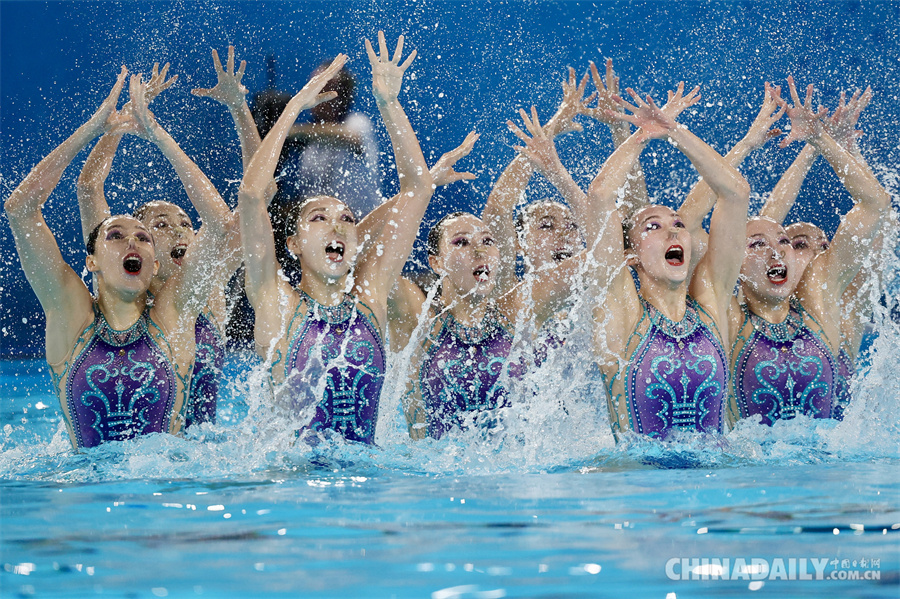
The artistic swimming at the Paris Olympics concluded its free routine competition on Tuesday, and Team China ranked first with its 398.8917-point performance. The result further strengthened its leading position among all the participating teams in the event, which has one last acrobatic routine to go on Wednesday.
With a total of 712.4455 points, Team China ranks first, and Team USA trails behind by 69.4200 points.

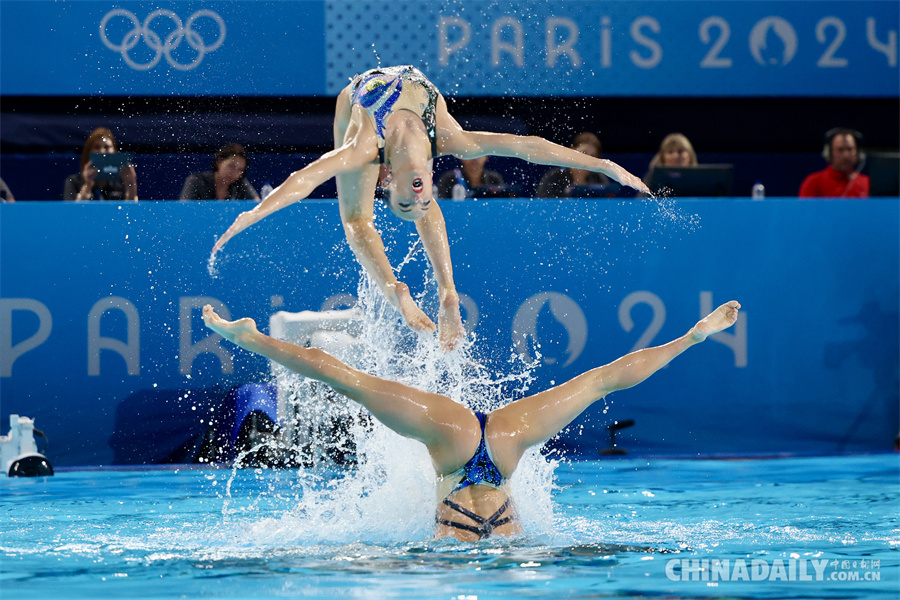
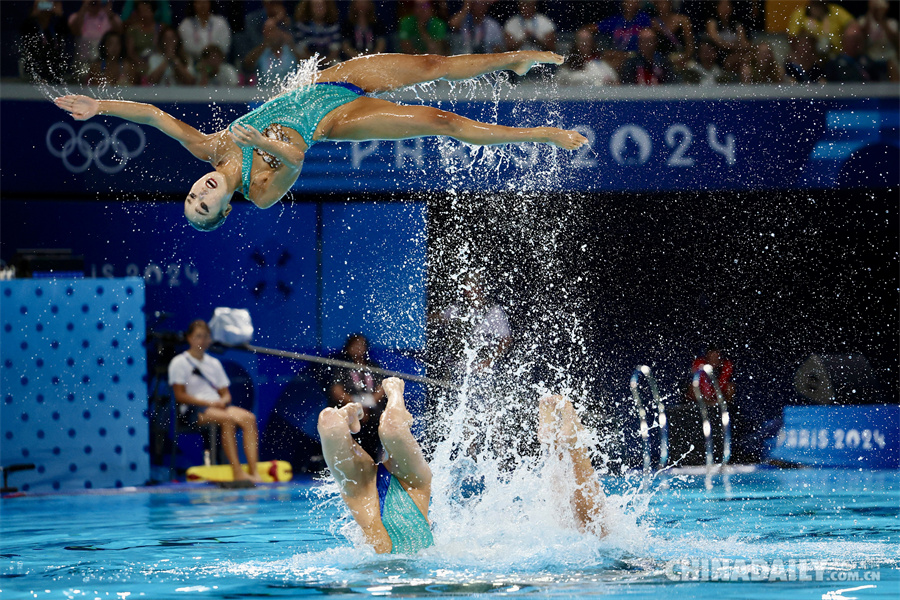
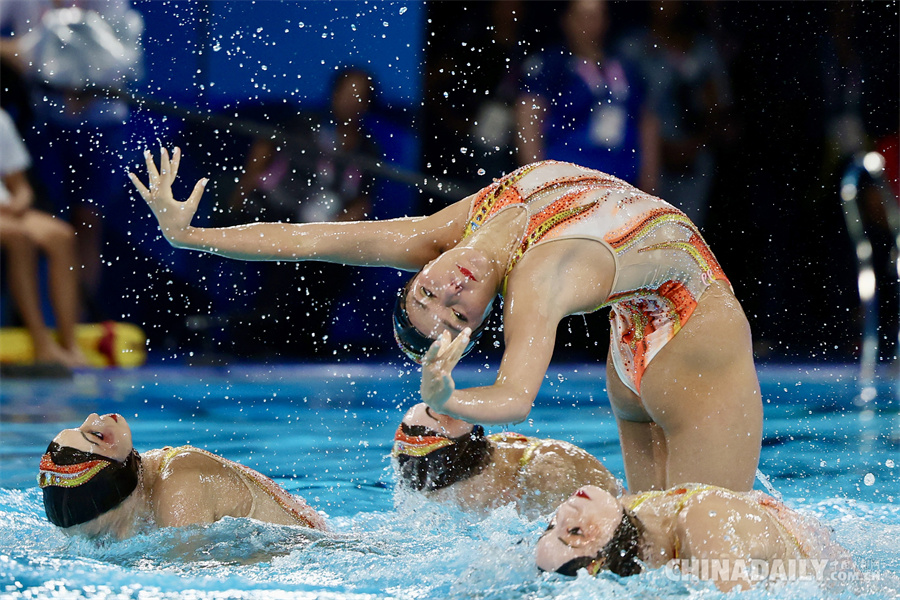
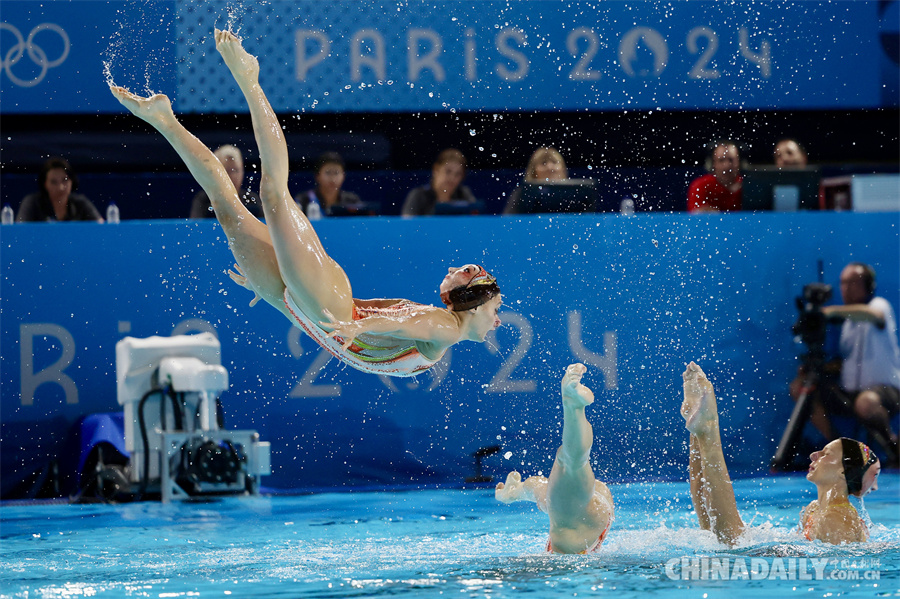

No pressure, just fun — China's skateboarding prodigy Zheng Haohao has embraced the high-stakes occasion of competing at the Olympics to just enjoy the sport as much as any of her peers.
Only, Zheng did it at a younger age than all the others.
When she dropped in for her first run in the women's park qualification round on Tuesday, she wrote a piece of history at these Games as the youngest athlete of any delegation across all sports to compete in Paris at 11 years, 360 days old.
To put it into perspective, Zheng has just completed her primary school studies and is enjoying her Olympic debut as probably the coolest graduation trip among all her classmates.
And for the result? She doesn't seem too bothered.
"I just relaxed, chilled out and tried to put on my best performance and, most importantly, enjoy the experience," Zheng, wearing a white helmet with cartoon graffiti, said in a calm tone after her qualification round.
"It was just so fun and so special to have a summer vocation unlike anyone else in school. I feel proud of it, the whole experience that I've been able to skate at such a big event on the international stage."
The park discipline of skateboarding involves athletes skating across a hollowed-out concrete bowl to perform a variety of tricks using different elements, such as ramps, quarter-pipes and bumps, to accumulate as high a score as possible in each 45-second run.
As passionate about skating as any of her senior counterparts, Zheng's lack of strength and speed due to her young age, however, cost her dearly in routine execution. She completed only her first run of the three attempts each athlete is allowed in the qualifier, ranking 18th among all 22 entries with a first-try score of 63.19 points.
She missed the top-8 cut for the final as expected, but has gained a lot more than just an opportunity to take three more runs.
"I made new friends that I wouldn't have met in classrooms, exchanged a few pins and learned some new tricks from all the other older sisters competing here," Zheng said of her biggest takeaway from Paris.
"All the older sisters have greater power and higher jumps than I did. I am just little and short now but I will learn from them and try to improve as much as I could."
Before Zheng, the youngest previous athlete representing a Chinese delegation at the Olympics was teen swimmer Nian Yun, who competed in the women's 4x100m freestyle relay at 13 years and 287 days old at the 1996 Games in Atlanta, in the United States.
sunxiaochen@chinadaily.com.cn
China's 17-year-old diver Quan Hongchan defended her gold medal in the women's 10m platform diving final at the Paris Olympic Games on Tuesday, with 425.60 points.
Her teammate Chen Yuxi won silver, scoring 420.70.
Kim Mi Rae, from the Democratic People's Republic of Korea, finished third, with 372.10 points.

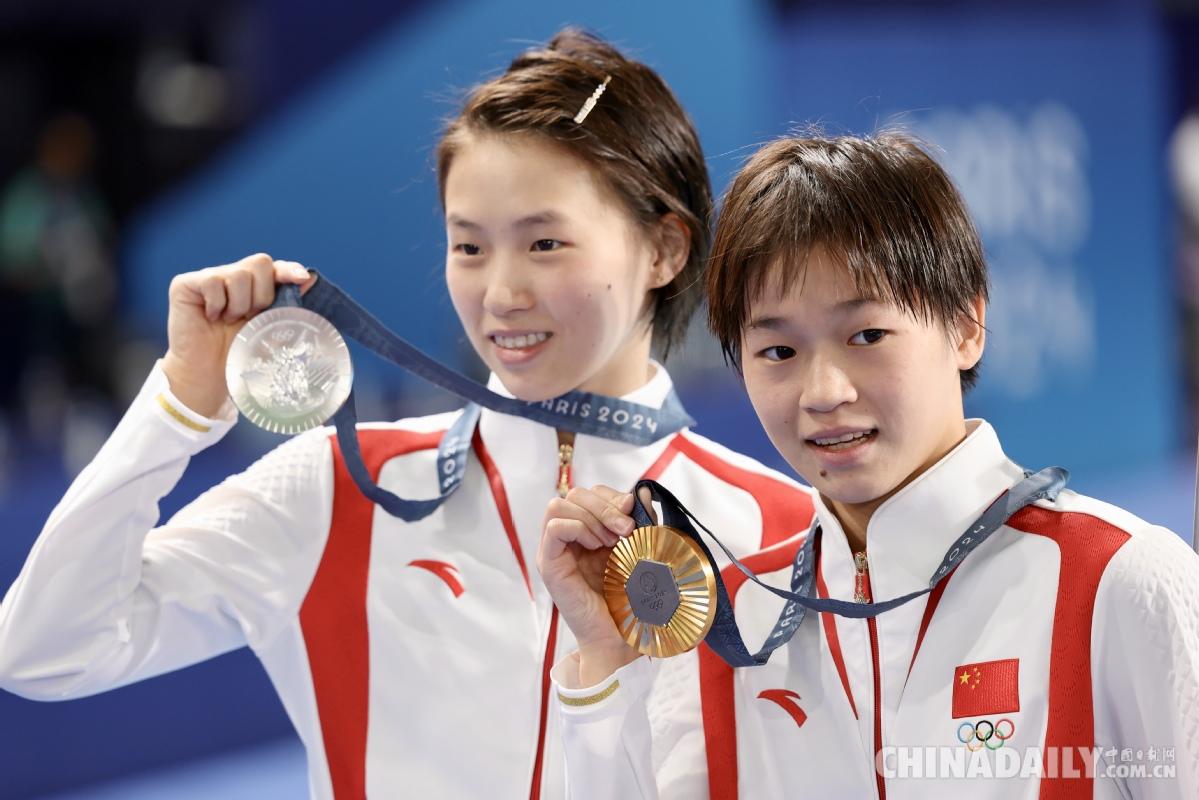
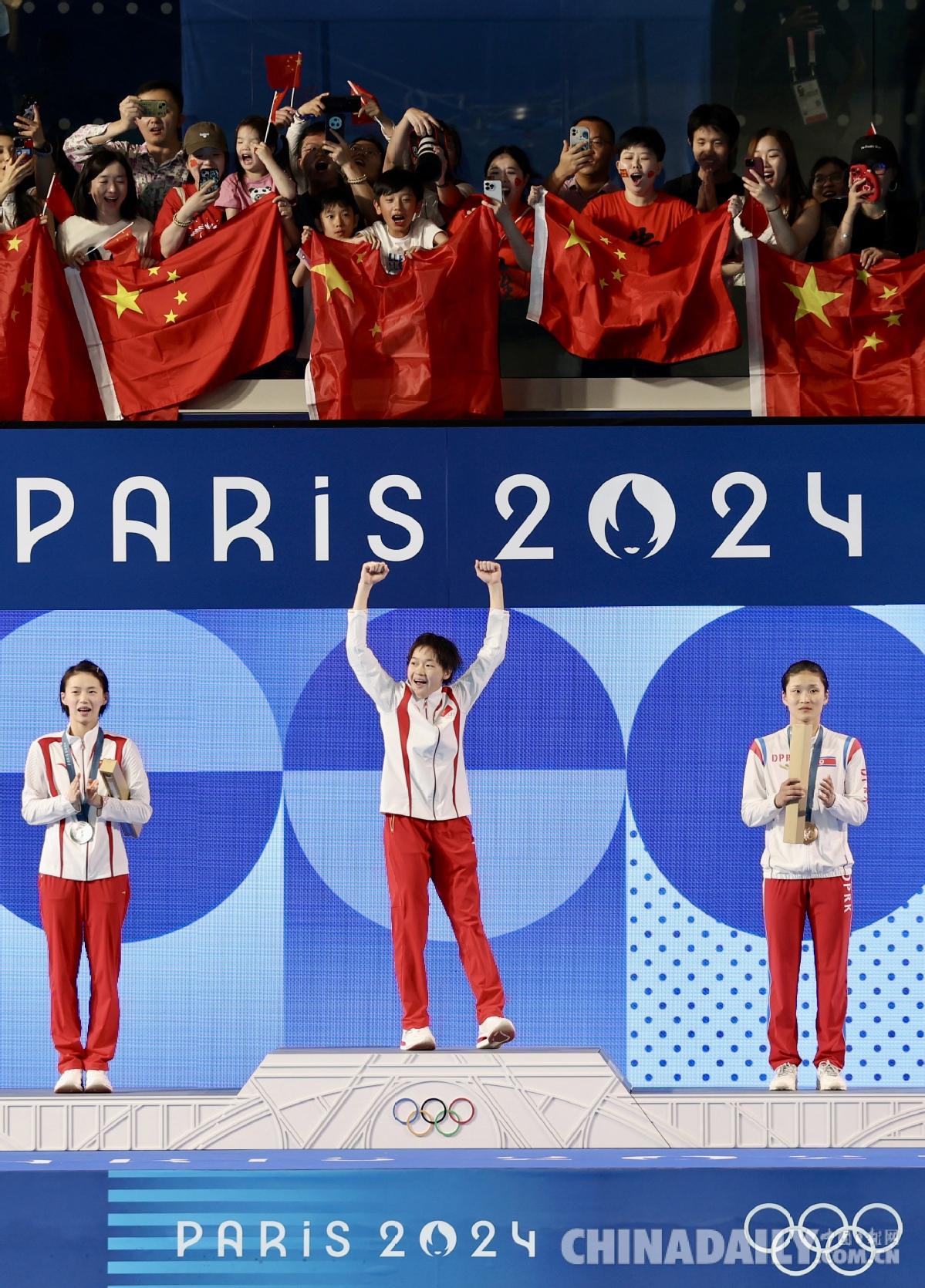


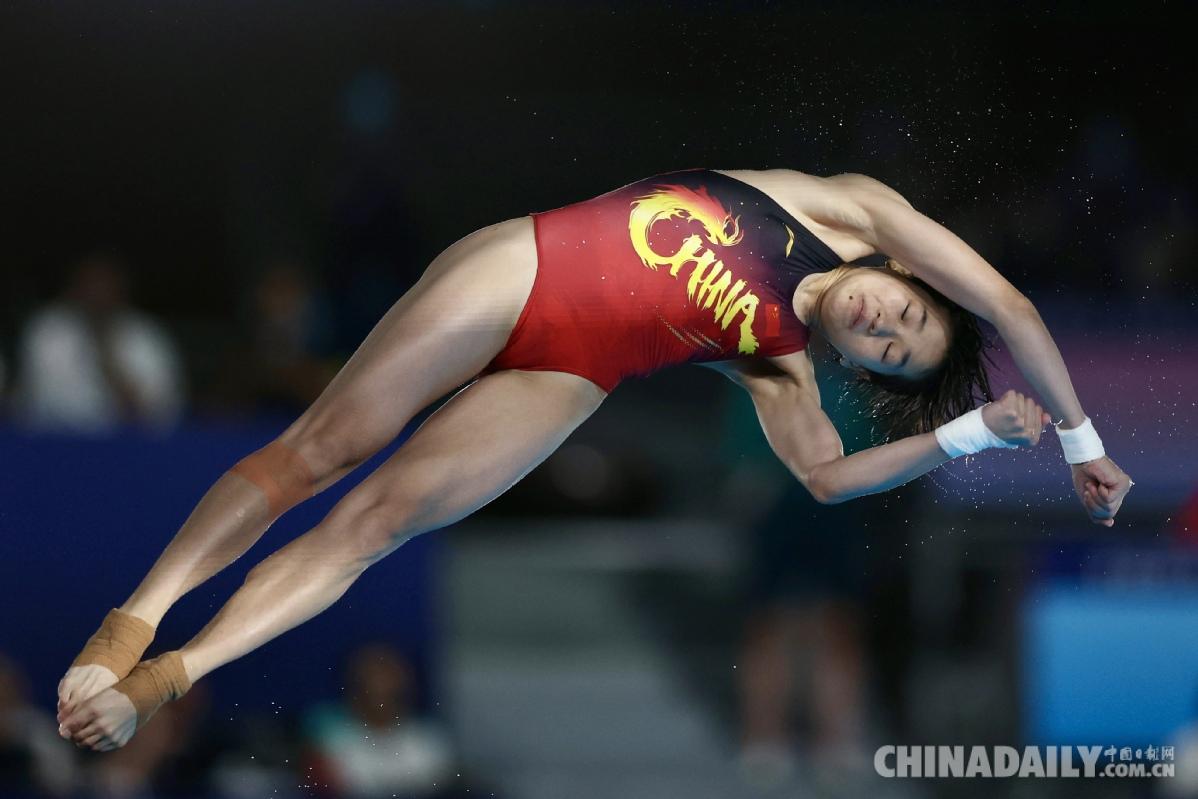
China lost to Turkiye 2:3 on Tuesday in the Paris Olympics women's volleyball quarterfinal, failing to advance to the top four.
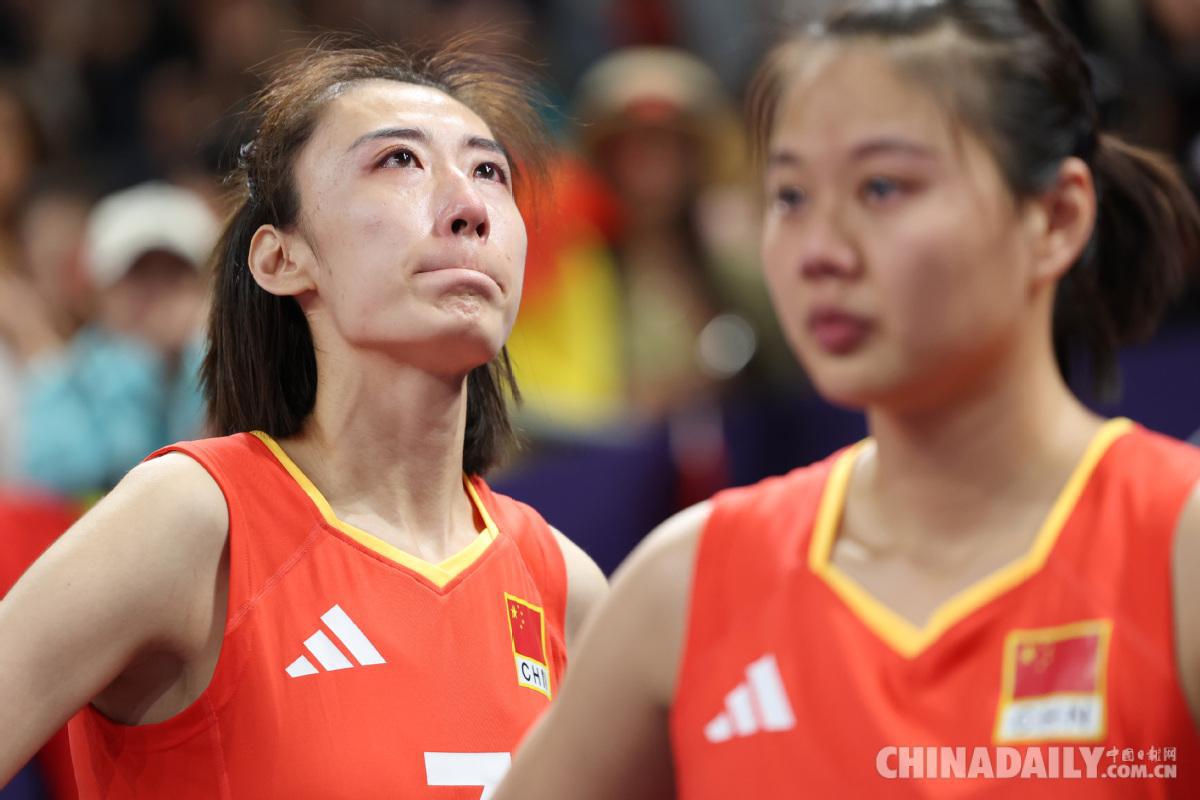
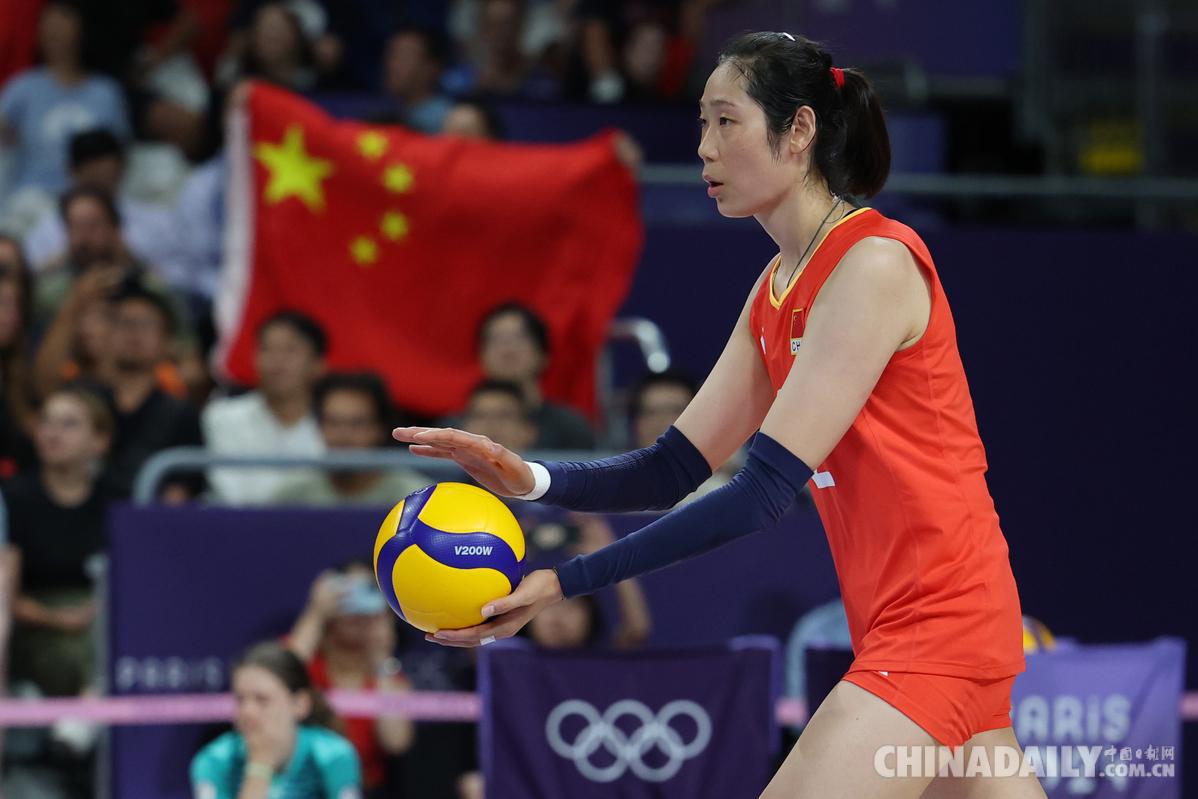

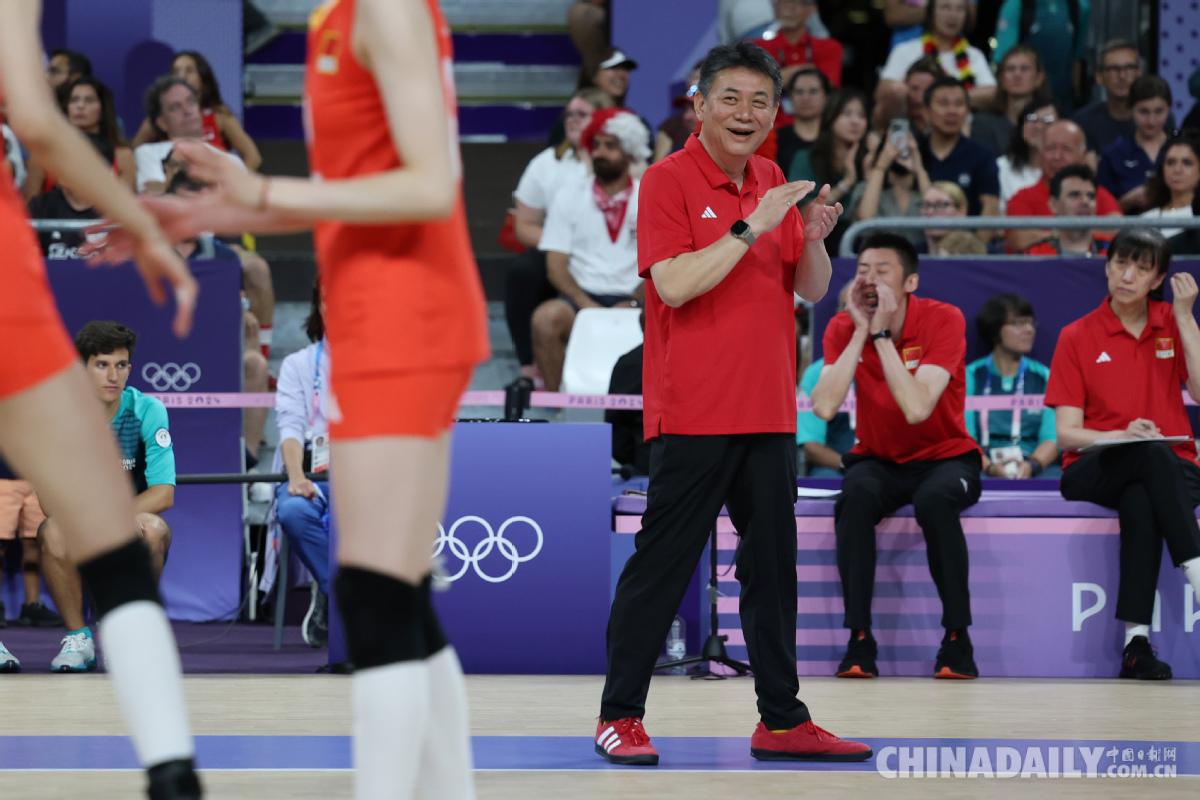
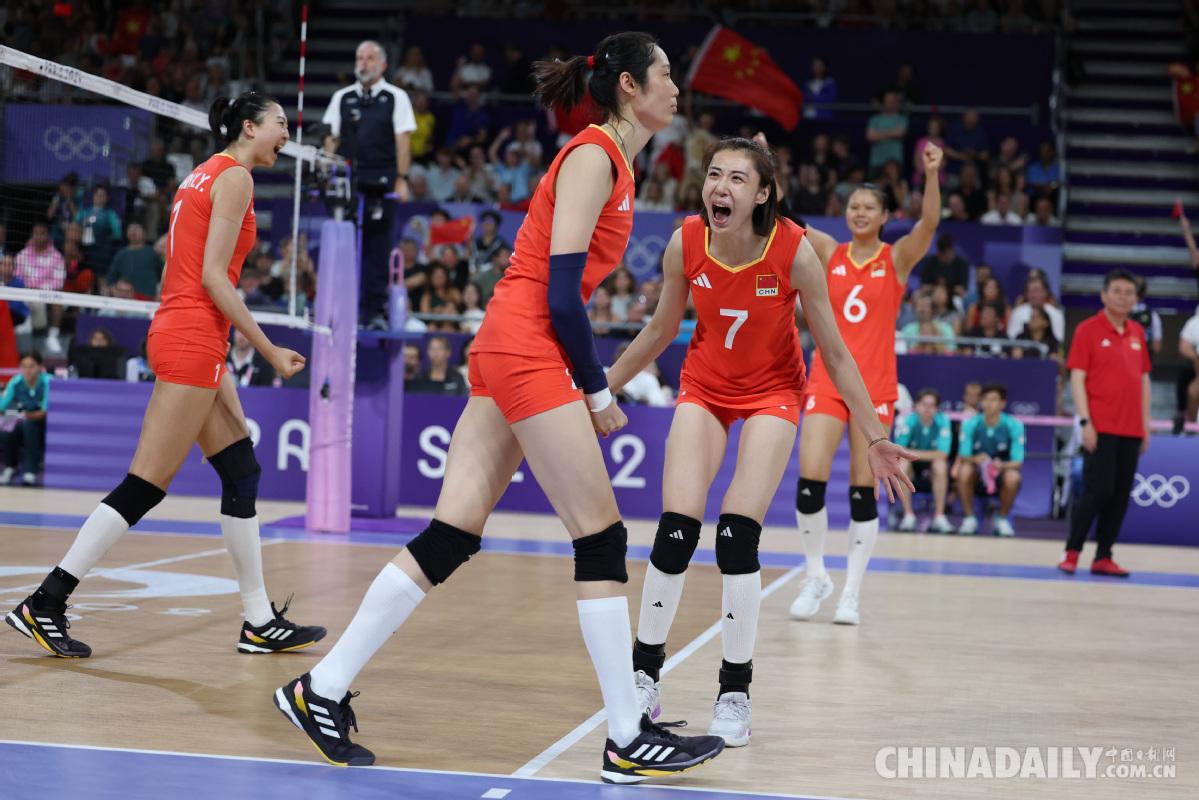
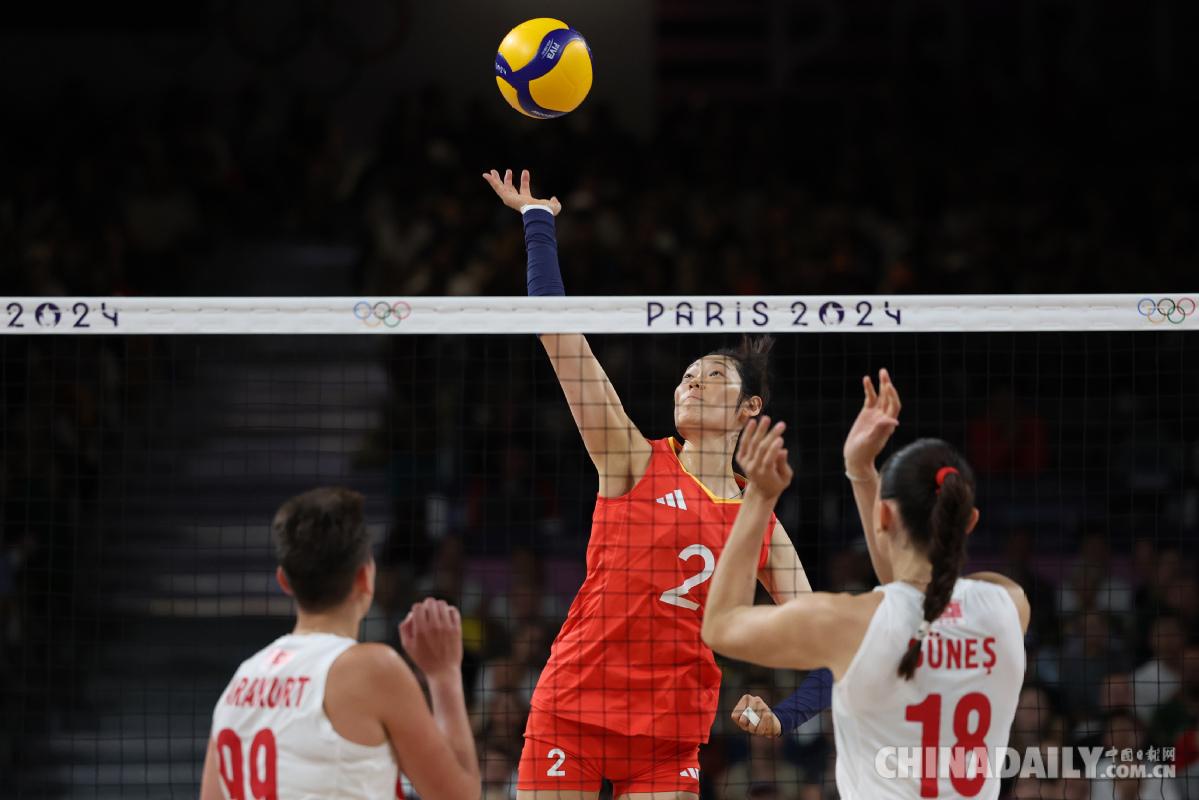
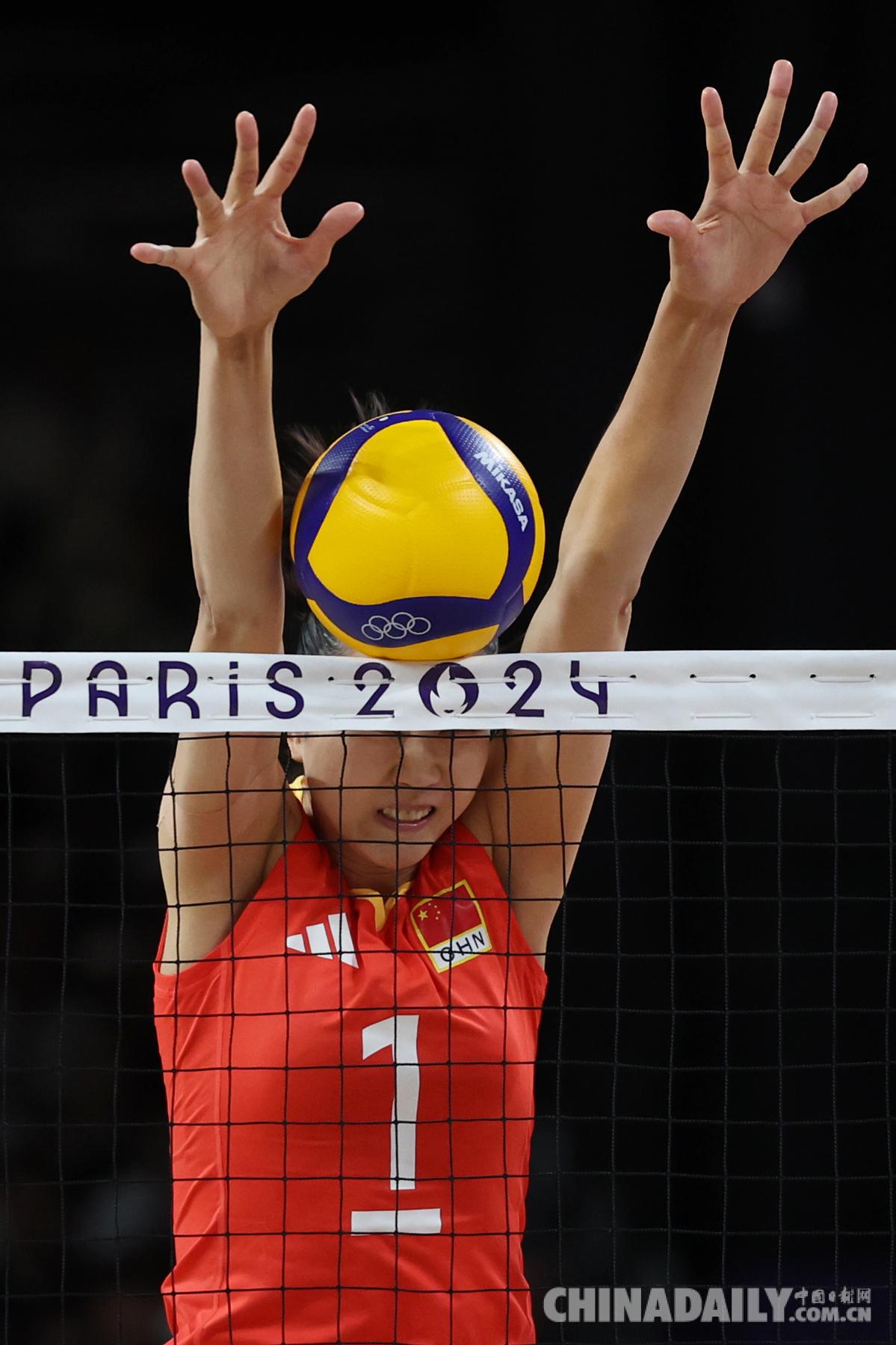

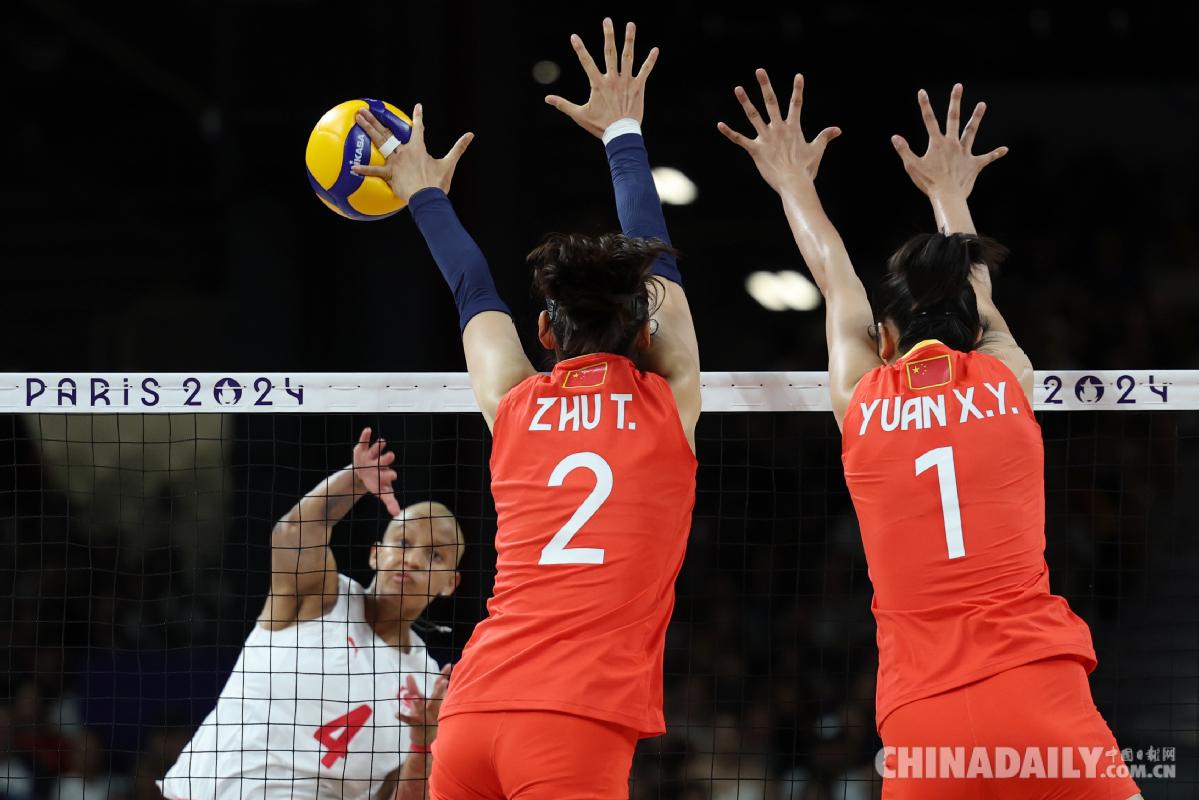
China made history ending the United States' 64-year dominance in the men's 4x100m swimming medley relay at the 2024 Paris Olympics on Sunday. It's the first-ever medal China gained for this event, attracting attention from around the world.

The World Aquatics, swimming's global governing body, and the Olympic Games organizing committee congratulated the Chinese swimming team on the social media platform X as soon as the result was determined. The Paris Olympics organizing committee also said in its post on X: "The team from the People's Republic of China wins the 4x100m medley relay in an epic race."
This stunning breakthrough also brought attention from international media. ESPN, an American international sports channel, said in its report that "China stunned the US by winning gold in the men's 4x100 medley relay". The Daily Telegraph, a British daily newspaper, praised Chinese athlete Pan Zhanle's performances as "a monumental effort".
Team USA showed their respect for the Chinese athletes' performances after the game as well. "Hats off to China, they did a great race tonight," American athlete Ryan Murphy told Reuters on Sunday.
Chinese swimmers have been under intense scrutiny since some western media unfairly portrayed a proven food contamination incident as a "doping scandal" at the Tokyo Olympics. However, most netizens said Pan's success came timely as a powerful response.
@AceDimension23 said on X, "US trolls can troll all they want, this is a clean race and they lost to China fair and square". @Angela_868 also said on X that Pan's result "must be enough to silence many doubters".
American swimming athlete Caeleb Dressel acknowledged the strength of the Chinese swimming team in a press conference after the game, "it's good for the (swimming) sport to have the whole world involved".

PARIS - With the theme Passion and Speed, China took the lead in the team acrobatic event on the first competition day of artistic swimming at Paris 2024 here on Monday.
Among the ten teams, China, who had swept five of six gold medals in team events over the past two World Championships, tried to balance the difficulty lifts with different leg movements and elegance, leading with 313.5538 points.
"We made some changes based on our previous routine with higher difficulty. It was a challenge and we tried hard to express all of our passion in the routine. We felt confident only after we confirmed our scores," said Wang Liuyi.
To head coach Zhang Xiaohuan, the packed arena was a source of great excitement. "We felt motivated by the great support from the fans. We tried to include some Chinese cultural elements into our routine, such as the posture we showed on the stage with Yong Chun Quan [kung fu]," Zhang said.
Spain finished the day second in 287.1475, with Japan and United States third and fourth with 284.9017 and 282.7567 points, respectively.
In Paris, the team competition consists of a single finals phase with all ten teams of eight swimmers performing three routines, including team technical, team free and team acrobatic, across three nights from August 5 to 7. The final result, and the basis for medals being awarded, is the sum of points from all three team routines.
